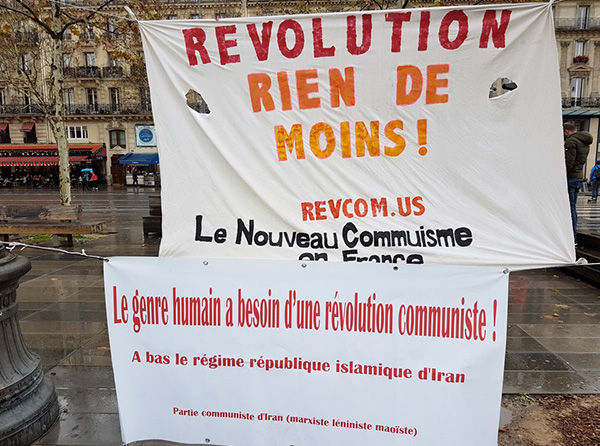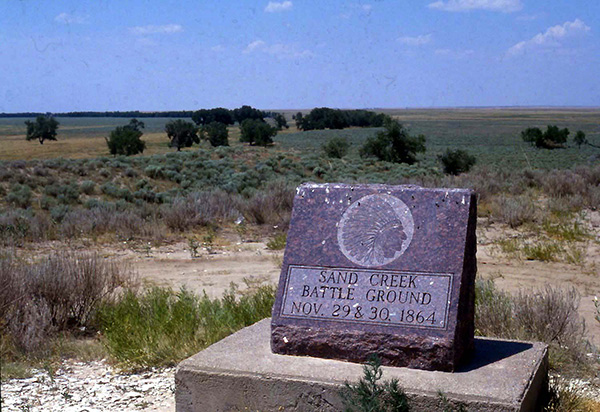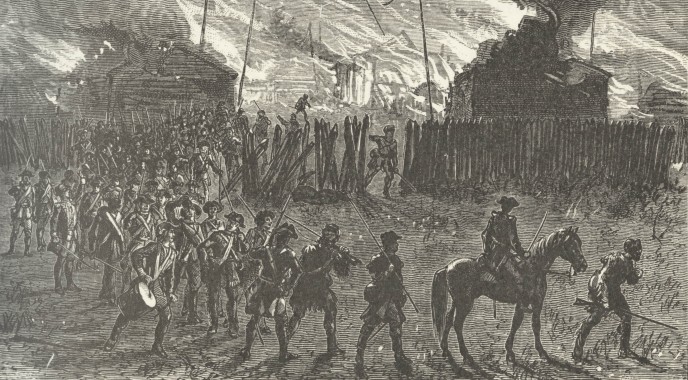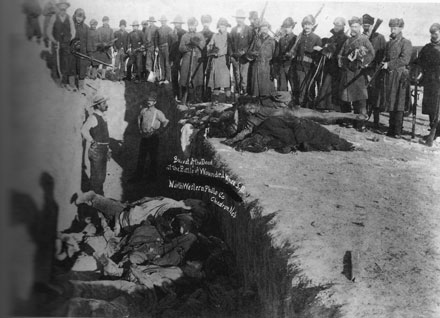Permalink: https://revcom.us/avakian/bob_avakian-the-problem-the-solution-and-the-challenges-before-us-en.html
Revolution #570 November 19, 2018
August 31, 2017 | Revolution Newspaper | revcom.us
Talk by Bob Avakian
The following is the text of a talk given by Bob Avakian (BA) to a Party working group in the summer of 2017. The audio of this talk is available here.
The Problem, the Solution, and the Challenges Before Us
Touching on Essential Questions Concerning the Actual History of this Country, The Nature of the Capitalist-Imperialist System We Live Under, The Consequences of This for Humanity, The Way Forward to a World Free of the Unnecessary Suffering and Horrors Bound Up With All This, and the Breakthroughs That Must Be Made Now
Part 1: Breaking with American Chauvinism and the Killing Confines of Capitalism
Contrary to all the mythology that is constantly perpetrated and perpetuated through the dominant institutions of this society and all of its spokespeople, the wealth of this country and the situation of the people within it is not owing to some great freedoms that are particular to this country and to the great innovativeness that this freedom allows and encourages. To get to the reality of what this really rests on we could go back to Marx, speaking about the primitive accumulation of capitalism on the basis of horrific plunder and unbelievable exploitation of masses of people in far-flung parts of the world. This provided the foundation on which the accumulation of capitalism began, coming out of feudal society, and the basis on which whatever innovation was carried out ultimately rested. Marx also spoke of the “rosy dawn” of capitalism with great irony. In the book Preaching From a Pulpit of Bones, I quoted Jack Weatherford who wrote Indian Givers: How the Indians of the Americas Transformed the World. He begins with this statement: “The capitalists [speaking of the United States, in particular, but the capitalists in Europe and other places as well—these capitalists] built the new structure on the twin supports of the slave trade from Africa to America and the piracy of American silver.” And then he goes on to quote Marx about the rosy dawn: “The discovery of gold and silver in America, the extirpation, enslavement and entombment in mines of the aboriginal population, the beginning of the conquest and looting of the East Indies, the turning of Africa into a warren for the commercial hunting of black-skins, signalized the rosy dawn of the era of capitalist production.” This is a basic and irrefutable truth.
We hear in connection with all these notions of the great freedom and innovativeness of people in this country and how the freedom allows for this innovativeness—we hear a lot about the expression “American exceptionalism.” Now, when first hearing this term you might think...you might not recognize that there is actually a certain ironic twist to this. You might think: “Yeah, well, that makes sense, ‘American exceptionalism,’ we have this good democracy here and people have a lot of freedom, but of course there are some things that ran really contrary to that in the history of the country—like the genocide against the Indians and all the slavery and everything else. Yeah that makes sense, it’s an exception, it’s a democracy but it’s kind of an exception because it has all these negative features associated with it.” And then, lo and behold, you discover that’s not what it means—that American exceptionalism means America is exceptionally good, that even in comparison to all the other “capitalist democracies” in the world, there’s something special, the shining city on the hill, as Reagan, for example, invoked it. You know, this image that there’s something particularly and specially good about America and its people. And you have to think: what an irony. This is completely upside down. If anybody wants to talk about exception, it should be talked about in the way I was just referring to it—that here are some real negative things here that stand in sharp conflict to “our democracy” which we still haven’t yet overcome. But no, it means the opposite—we’re exceptionally good.
And think of the level of American chauvinism you have to have internalized not to vomit upon hearing that. Let’s look a little bit more at the actual founding cornerstones and the long shadow of slavery in this country along with the genocidal dispossession and rounding up into concentration camps called reservations of the native population, the original population.
The treatment of Black people in this country, the horrific oppression of Black people from the time of slavery down to today—if you want to talk about a special characteristic of America, that’s one of the most distinguishing. And that slavery has been built into the very foundation: it is a cornerstone of the entire society, and its shadow continues to cast itself over the entire society, the entire country and everything about it, right down to today. If you look at the founding documents of this country—for example, if you look at the Declaration of Independence—what are the indictments that are made against the King of England in declaring independence? Among them is the following: “He has excited domestic Insurrections amongst us, and has endeavored to bring on the Inhabitants of our Frontiers, the merciless Indian Savages.” Now, think about this. Here are people who repeatedly broke treaties with these very Native Americans, the original inhabitants, who never in fact kept a single treaty they made with them, who drove them repeatedly off the land—would grant them land but, “Oh, wait a minute, there’s gold there.” So they have to be uprooted again and put on these Trail of Tears marches where thousands died over and over and over again. And then, in turn, we hear these people described as “the merciless Indian Savages” whom the King of England is inciting against these settlers. This is one of the great crimes of the King of England according to the Declaration of Independence. Again, reality is turned completely on its head.
And then of course it goes on and talks about how the King of England has forced the slave trade upon the European settlers of this territory—as if somehow none of them, including Thomas Jefferson, wanted to have slaves. Never mind the fact that he engineered the Louisiana Purchase to greatly expand the territory that would be slave-based. Somehow supposedly the King of England is responsible for forcing slavery on people like Jefferson and these other founders.
Or look at the Constitution of the United States. Not only the infamous three-fifths clause which declared that the slaves were three-fifths human beings, to be counted as three-fifths for the purposes of taxation and representation; but even such things as the electoral college were in fact engineered in that way, established, and established in their particular forms, as concessions to the slave states. Recently in the New York Times, in a special supplement on the Constitution on July 2, 2017, Garry Wills went into how the Second Amendment itself was not about individuals owning arms—that’s not what was being... that was not the concern that was being addressed. It was, in particular, the right of the slave states to have militias to hunt down slaves and put down slave insurrections. So right there, again, in the very founding of this country’s basic documents, and in the way this has extended its shadow right down to today, the horrific oppression of the original inhabitants, and then of Black people—or of Black people along with that—it’s right at the core of what this country is about, from the beginning to today. The fact is that white supremacy and its continuation in different, but always horrific, forms has been built into the very foundation and structures, the social relations and the culture of this system in this country and is an indispensable part of its ongoing cohesion and functioning.
Now, in light of all this, you might think it’s a little ridiculous when people say something like: “Fascism couldn’t really happen here. We have all these institutional protections against it, and, once again, we are these exceptional people. So how could fascism happen here? It couldn’t happen here.” Oh no, it couldn’t happen here. Not in a country founded on slavery and genocide and steeped in white supremacy as well as male supremacy, manifest destiny and white man’s burden. Oh no, it couldn’t happen in a country like that. And it is important to point out about all these things—the white supremacy, the male supremacy, the American chauvinism, the manifest destiny, the white man’s burden—all of these have been, and remain, intertwined and mutually reinforcing.
If you turn to the book, for example, The Rebirth of a Nation by Jackson Lears—which focuses on the era when the U.S. really pushed itself out into the world as a colonial power, gobbling up the Philippines as well as Puerto Rico, Guam and Cuba, and entering onto the world stage on a level of thuggery previously unseen—he talks about how all this was bound up with a certain sense of male identity and male assertiveness, as well as white supremacy, in rather grotesque forms, unvarnished, the way we’re seeing it coming back now, unvarnished, under the Trump/Pence fascist regime. For example, he cites the woman, Rebecca Latimer Felton, who was the wife and campaign manager, not of a dog catcher, but of a U.S. Congressman, who said that one of the great problems in American society was that men were not providing adequate attention to “white women’s vulnerability to the Black rapists” who were supposedly roaming the rural South. “The fault, she declared, lay with southern white men. They had failed to put a ‘sheltering arm about innocence and virtue.’” She concluded that “if lynching was required ‘to protect women’s dearest possession from the ravening human beasts—then I say lynch, a thousand times a week, if necessary.’” The wife and campaign manager of a U.S. Congressman.
Or let’s look at another statement that shows the horrendous dimensions of this and the way in which all of this is intertwined. In particular, here is the male chauvinism, the patriarchy, the misogyny. Lears writes: “Behind all the economic calculations and all the lofty rhetoric about civilization and progress was a primal emotion—a yearning to reassert control, a masculine will to power.” In particular, this was speaking to the sense that the elite, the wealthy men, had become soft as a result of their riches. And so what was said was necessary to deal with that? War—this would be a masculinizing effect on these feminized wealthy effete men. This was the way that they could experience regeneration.
Or look at the following comment, speaking about the cult of courage and an urge to warfare: “Here,” Lears writes, “was the germ of the worship of force, the secular religion that underlay the regeneration of masculine will.”
And here’s something very interesting in light of the tactics and strategic approach of U.S. imperialism in invading and occupying countries these days. If you think back, for example, to the first Iraq invasion in 1991, Colin Powell said: “We’re not imperialists, we don’t invade countries in order to occupy them, we don’t engage in permanent occupation. We just democratize them and then leave them to the people to run themselves.” Well, this is a well-worn approach of the imperialists, which was being applied as far back as the end of the 19th and beginning of the 20th century. Lears speaks to this. He speaks to the approach that the American empire would depend only in part on formal acquisition of foreign colonies, which it did occupy, for example once again, the Philippines. “More commonly it would involve periodic military intervention (rather than permanent occupation) and support for governments friendly to American policies. This indirect approach [to colonialism, I’m adding] would make it easier for American imperialists to wrap themselves in exceptionalist rhetoric and claim moral superiority to their European counterparts.” Here we are again with American exceptionalism, ravishing and plundering colonialism with a particular twist that enables them to say: “Oh no, we’re not colonialists like those Europeans.”
And finally, from Lears he talks about how the resistance of the Philippine people to U.S. occupation was taken by the Americans, including the soldiers of the American imperium, was taken as an affront to white identity and to white being.
So you can see how all of this is all intertwined and mutually reinforcing. And then there’s something that should also be recognized, especially in light of the present situation. There is a direct line and deep connection between all this, and the way in which all this is intertwined and mutually reinforcing—a direct line and direct connection between all this and the virulent hatred and repressive actions directed today against the fight for the recognition of the humanity and the rights of LGBT people.
It is crucial that people be won, including through struggle waged well, to look squarely into the reality of what this system is built on and how it really works, and come to understand why the horrors it causes cannot be reformed away. Here I can only touch on the actual reality of what this system is, how it operates and why, and the terrible consequences of this for humanity. In the Interview with Ardea Skybreak, SCIENCE AND REVOLUTION, this is discussed more fully. In THE NEW COMMUNISM, the basic contradictions and dynamics of the system are dug into in some depth. And there is continual exposure and analysis fleshing out all of this on the website revcom.us. But to put this in kind of concentrated way, and what is the actual history and foundation and reality of this country, let’s look at BAsics 1, 2, 3, and 4, beginning with BAsics 1:
There would be no United States as we now know it today without slavery. That is a simple and basic truth.
Now, of course, slavery was not the only factor that played a significant part in the emergence of the U.S. as a world power, whose economic strength underlies its massive military force. A major historical factor in all this was the theft of land, on a massive scale, from Mexico as well as from native peoples. But, in turn, much of that conquest of land was, for a long period of time up until the Civil War, largely to expand the slave system. “Remember the Alamo,” we are always reminded. Well, many of the “heroes” of the Alamo were slave traders and slave chasers....And expanding the slave system was a major aim of the overall war with Mexico, although that war also led to the westward expansion of the developing capitalist system centered in the northern United States.
The essence of what exists in the U.S. is not democracy but capitalism-imperialism and political structures to enforce that capitalism-imperialism. What the U.S. spreads around the world is not democracy, but imperialism and political structures to enforce that imperialism.
Not only did slavery play a major role in the historical development of the U.S., but the wealth and power of the U.S. rests today on a worldwide system of imperialist exploitation that ensnares hundreds of millions, and ultimately billions, of people in conditions hardly better than those of slaves. Now, if this seems like an extreme or extravagant claim, think about the tens of millions of children throughout the Third World who, from a very, very early age, are working nearly every day of the year—as the slaves on the southern plantations in the United States used to say, “from can’t see in the morning, till can’t see at night”—until they’ve been physically used up....These are conditions very similar to outright slavery....This includes overt sexual harassment of women, and many other degradations as well. All this is the foundation on which the imperialist system rests, with U.S. imperialism now sitting atop it all.
Now again, this might sound like exaggerated or extreme descriptions. But in fact, it is an accurate description of the reality of today and the whole historical development leading up to it, in terms of this country and its role in the world. As I said elsewhere, many examples have been given to bring to life more fully the reality of this, and much analysis has been made of how and why this system cannot operate on any other basis than this. For example, in the book, THE NEW COMMUNISM. But, as a shorthand way of saying this, it can simply be stated that there is not a single thing that finds its way into the consumption markets of the U.S. and similar countries which has not gone through, in its chain of production, horrific forms—the most vicious exploitation and oppression—in far flung parts of the world, in particular, the Third World. Not a thing.
We can go to another statement by Marx: “Capitalism came into the world with blood dripping from every pore.” And it has maintained itself down to the present day, on an even greater scale, on exactly the same basis. This country and this system is most emphatically not a force for good in the world, but on the contrary the greatest cause of unnecessary suffering for the masses of humanity.
Now, let’s look at another one of the narratives they like to run out to talk about the great nature of this country and of this system of capitalism—job creation. “The capitalists are not exploiting people, they’re creating jobs. If they go to Indonesia or Guatemala or Haiti or Pakistan or Bangladesh or India and have children, or even adults, working for less than a dollar a day—why that’s better than the alternative. If it weren’t for these capitalists going there, these people wouldn’t have a way to have a livelihood at all. So, yes, maybe the conditions are not as good as you and I might like them to be, but they’re much better than they would be otherwise.” This is a typical rationalization, it’s one of the most disgusting rationalizations. And it’s a complete tautology. It amounts to saying: Under the system of capitalist-imperialism, the choices people have range from bad to worse. And it’s a complete lie. If you step away and out of the confines of the self-contained logic of the capitalist system, think about it: The raw materials are there, the people are there—that’s what you need to develop an economy. The question is, on what terms and through which means are you developing that economy with those people and those raw materials?
Once again we’re back to the question that I focused on centrally in THE NEW COMMUNISM: through which mode of production are things done? Capitalism is not the only way, and is certainly far from the best way, to “create jobs” and for people to have meaningful employment. It is possible to have a radically different economic system, the system of socialism, in which people’s work is not exploited for the benefit of cut-throat competing capitalists who are now cut-throat competing capitalists on a world scale, who immediately, as soon as they find it not profitable enough, stop creating those jobs in this country and go to another country where they create jobs, until they find another country where they can go and more ruthlessly exploit people. The people are there. That is the most important thing. And with the people it is possible now to have a radically different economic and social system which is not built on exploitation and oppression—which, in fact, moves to do away with every form of exploitation and oppression—the socialist system moving toward communism on a world scale, at which point all exploitation and oppression will have been eliminated.
So again, the question is: what’s the economic system underlying all this? Or, once again, through which mode of production are things done? Through an exploitative and oppressive system, or one which is moving to eliminate exploitation and oppression and unlocking and unleashing all the human potential in that direction and for that purpose?
Now, I’ve talked elsewhere and emphasized the anarchic workings of this system. Once more, let’s go back to Marx, who said about the system of capitalism: Its total disorder is its order. This is speaking to the anarchy of these different capitalists who, because of the internal nature, contradictions and dynamics of their own system—which, once again, is gone into in THE NEW COMMUNISM—but because of its very internal nature, its very intrinsic nature, its very internal contradictions and dynamics, is a system that rests on ruthless exploitation and ruthless competition between different units and aggregations of capital, competing intensely with each other today on a world scale and in a highly globalized way.
The point, the brutal reality...we hear, for example, all this from these high-tech billionaires and so on, talking about “epic fails” and the “creative destruction” of the way in which they come in and completely undermine the way things have been done and bring in new ways of doing things. And this is upheld as a great phenomenon in the world, this creative destruction. Even where you fail, you learn how to succeed at creating more creative destruction—in other words, more exploitation. And again, the brutal reality is that this disorder, this creative destruction, causes tremendous suffering on a world scale of people and of the environment, which this system and its internal dynamics have brought to the point where the very future and existence of humanity is seriously threatened. And then, on top of all that, there is a massive destruction brought about by the wars, the coups, and other bloody actions which are carried out in every part of the world to enforce this system’s oppressive rule.
The military of this country is not a body of heroes who should be thanked for their service, but a machinery of perpetual war crimes and crimes against humanity, repeatedly carrying out slaughter and destruction on a mass scale in the service of a system literally built on blood and bones. Once again, this may seem like an exaggeration or an extravagant claim, but look at the wars that have actually been carried out by this military, in the present day in the Middle East, and the horrific results of their invasions and occupations and everything this set loose. Or Vietnam. Or the coups they pulled off from Iran to Guatemala to Indonesia to Chile, which have cost the lives of literally more than a million people—just those coups and their consequences. This is no exaggeration. This is the reality that people have to be brought to confront.
And as for people who should be appreciated, those from this military who should be supported are those who have broken with it, especially those who have come over to the side of opposition to these crimes and the system this military enforces with its depraved violence and massive destruction. And depraved violence is a very apt description. You can go back to Vietnam, not only the massive bombing with chemical weapons—Agent Orange, napalm which literally sets fire to people’s flesh—but the My Lai massacre, which was not an aberration or an exception or a one-time deviation, but a repeated pattern by the U.S. military in Vietnam. The soldiers who became so degraded that they cut off the ears of the people they slaughtered and carried them around as trophies. This is the reality of those that the rulers of this country want people to celebrate as heroes. Because this is the nature of the military that these people are serving in and its role in the world.
Now, along with everything already spoken to in terms of the actual history of this country, as well as its role in the world right up to the present, the theory of government and the founding documents of this country—as articulated, for example in the Declaration of Independence—this theory of government is in fundamental conflict with reality. Let’s look at one of the most oft-quoted statements from the Declaration of Independence. And often you’ll hear people celebrating democracy who will quote this opening of the Declaration of Independence right after “When in the course of human events” and so on (I guess people still memorize this in school on some occasions), there’s this famous passage:
We hold these Truths to be self-evident, that all Men... [Nota Bene, as they say: all men are created equal, note well] all Men are created equal, that they are endowed by their Creator with certain unalienable Rights, that among these are Life, Liberty and the Pursuit of Happiness. That to secure these Rights, governments are instituted among Men, deriving their just Powers from the Consent of the Governed.
Now, I have to say there should be a certain prize given here, because it’s hard to conceive of packing more bullshit into such a small number of sentences. First of all, leave aside the part about “endowed by their creator.” Let’s leave aside the fact that there is no creator, there is no god, nobody is endowed with anything by a non-existent being. That’s the first point. But let’s leave that aside. Let’s move on to the core of this—that to secure these rights (life, liberty and the pursuit of happiness)... by the way notice that in the Constitution “life, liberty and the pursuit of happiness” is replaced with life, liberty and property, including that the slaves were property. But anyway, to secure these rights of life, liberty and the pursuit of happiness “governments are instituted among Men, deriving their just powers from the Consent of the Governed.” Well, this completely flies in the face of the actual history of human beings. Human beings who evolved and lived in early communal societies were not marked by all the features of the kind of society that’s spoken to in the Declaration of Independence and the Constitution of the United States. They did not have the kind of oppressive class divisions within their own small societies that are taken for granted in the world today by the defenders of this system and those who don’t know better, even if they should. And the evolution of human beings from there to the present time did not take place through gatherings of the people to institute governments among them which derived their just powers from those who gathered together to create these governments.
Think back to the statement by Marx, describing the “rosy dawn” and what the primitive accumulation of capitalism rests on. The inhabitants, the original inhabitants, of the mines of Potosi in Latin America, who were literally worked to death in the mines— passing their flesh literally into the structures there—they were not governed by an association of people that had come together to choose this. The slaves who were hunted down in Africa... Yes, there was slavery in Africa—we have to speak to what’s raised by all these fascists and others—yes, there was slavery in Africa; yes, there was slavery among the original inhabitants of the Americas. But it was on a very small scale, part of the fabric of those societies. When slavery and genocide became tethered to the machinery and fed into the maws, the jaws of capitalist accumulation and exploitation, it became a whole other thing on a whole other horrendous level, involving and killing millions of people and grinding millions more to an early death. Those people did not come together and choose a government that derived its “just powers” from their decisions.
In the feudal societies of Europe and Japan and China, the serfs did not come together with the nobles and hold a conclave and decide upon the government of their choosing whose “just powers” derived from their decision and their consent.
Oftentimes, as I’ve pointed out elsewhere, people did things out of necessity which led to great changes which they themselves did not anticipate and might not even have wanted. Now, I spoke in another work about people in Mexico, for example, thousands of years ago, who lived by hunting and gathering, and then by their own activity, used up many of the resources that they were depending upon, and also due to changes in the natural environment, they were forced to leave the area they were hunting and gathering in, and they went and settled by a river and began to carry out settled agriculture. This is just one of many examples of how this has happened repeatedly throughout the world. And then class differences of a very oppressive nature began to develop among them because of the new situation they were in. Some people were more favorably situated near a river—on more arable land, for a combination of factors—so polarization developed among them. It wasn’t that they sat down together and said: “Let us develop a society in which there’s polarization among us, in which some will thrive and others will suffer and in which those who thrive will exploit those who suffer so they will suffer more—this is what we choose to do as a way to be governed. And of course that government that we established for these purposes will derive its ‘just powers’ from our consent.” This is absolute nonsense. It completely flies in the face of reality. And it has nothing to do with the reality of the United States of America when it broke from England and established a different new country. The slaves were not part of any conclave, nor were the original inhabitants, the so-called Indians—they were not part of any conclave to establish a government deriving its “just powers” from their consent. The character of this society, the class divisions, the social relations in this society were not decided by people sitting down and having a meeting to discuss: “Okay, some people are going to be farmers, and some are going to be rich farmers and some are going to be poor farmers, and some are going to be indentured servants to these other people, and some are going to be slaves, and some are going to be dispossessed of everything they own, and during the course of the Civil War we’re going to start a westward expansion 90 years from now, but let’s plan it now. Ninety years from now we’re going to start a westward expansion to drive the remaining original inhabitants off their land, killing them in the process, suppressing them through warfare. And we’ll bring a bunch of Chinese in, force them to work on building the railroads so we can expand all the way to....” What kind of nonsense is this?! It has nothing to do with how the country was founded, how it developed, and what role it has played in the world right down to today.
These things arise out of the conflict between the necessity that people face and the means they devise to try to transform that necessity through a series of different societies, which are fundamentally founded on the relations that people—in the face of that necessity, and in the face of what they’ve inherited from previous generations—the relations they enter into to meet their material requirements of life, and the superstructure that arises on the basis of this—political institutions, political processes, ideology and culture—which serves those underlying economic relations which are not static and forever but continually change with changes in conditions, including the new productive forces that are brought forward through this process. This is how society has developed from the earliest emergence of human beings down to the present. And the important thing is that it was not predetermined to do so but it has come to a point where there are now the actual material conditions to do away with all these oppressive divisions and exploitative relations among human beings of every kind.
Besides what I’ve spoken to here, this is gone into in greater depth in Birds Cannot Give Birth to Crocodiles, But Humanity Can Soar Beyond the Horizon, Part 1. And there is also a very good concentrated discussion of the basic principles that I’m discussing here in Making Revolution and Emancipating Humanity, Part 1, particularly in the section “How Does Human Society Actually Develop?”
The truth really does matter, and it is very important to insist on and struggle fiercely for the critical importance of actually following the truth wherever it leads—as opposed to the longing, all-too-common among liberals and “progressives”: “Please, can we put an end to these lies from Trump that make me uncomfortable and get back to the lies about this country that make me comfortable.” In the “Democracy” book, (Democracy: Can’t We Do Better Than That?) I wrote: “[I]n all bourgeois democratic countries—and this is no exaggeration—from the very earliest age, through the educational system, the mass media and in other ways, the people are systematically misinformed and lied to about every significant question of current political and world affairs and of world history, and are systematically indoctrinated and imbued with an upside-down world view and errant methodology.” (That’s on page 190, for those who want to look at it.) This is obviously a very provocative statement, and it is as true as it is provocative. In fact, it is so provocative precisely because it is so profoundly true. That is, it seems outrageous precisely because people have been so systematically misinformed and misled.
I’ve already touched on some glaring examples of this, speaking to the actual history of this country and its role in the world. Some others will be spoken to through the course of this talk, and many, many other examples could be cited, including the lies and distortions by the dominant institutions and representatives of this system about the wars waged by this country, about socialism and the overthrow of socialism in the Soviet Union and China, the Great Depression of the 1930s and how it was ended, World War 2 and how and why the U.S. emerged as the most powerful imperialist country after that war, what the situation is with Korea and why, what the ’60s was really about, the character and role of imperialist heads of state who are presented as great leaders like Kennedy, Johnson, Reagan, Franklin Delano Roosevelt and Churchill, and on and on and on.
While it is right and necessary to unite with people broadly in opposing the injustices and outrages committed by those who rule this country, and while this has taken on heightened importance with the coming to power of the Trump/Pence fascist regime, it is a basic truth that without breaking with American chauvinism—without confronting the very real horror of what this country has been, and what it has done, here and all over the world, from its founding to the present—and without coming to deeply hate this, it is not possible, in the final analysis, to retain one’s own humanity and act in the highest interests of all humanity.
Before moving to Point 2, I just want to make a clarification. In the Declaration of Independence, along with the point about inciting the slaves to carry out domestic insurrection against the slave owners and inciting the “Indian Savages” to make warfare against them (the colonists), the point about the King of England forcing slavery on the colonies was actually, I believe, in Jefferson’s original draft of the Declaration of Independence but for whatever reasons did not make it into the final version. But nonetheless you can see Jefferson’s thinking there.
Part 2. The Decisive Importance of Method—Scientific Method—in Understanding and Changing the World
First, we need to speak to the glaring lack of materialism that is so widespread and common in regards to what this system is, how it actually functions, why it functions as it does, and what the consequences and implications of this are. Here, again, we can refer back, for example, to the point I made earlier about the narrative of “job creation”—as opposed to the reality of ruthless exploitation. But this lack of materialism is, in fact, extremely glaring. This is what you find, instead of people basing themselves on the critical breakthrough that Marx made in establishing what is the foundation and what are the dynamics of human society in general, what are the fundamental dynamics—the relations between what the forces of production are at hand and therefore correspondingly how people enter into economic relations in order to utilize those productive forces, and on that basis, the superstructure that arises of politics, ideology and culture, and the back and forth, the dialectical relation between and contradictions and relations within, the economic system, between the forces and relations of production, and how those are constantly moving and changing, and in terms of the contradictions between the economic system and the superstructure of politics and ideology that develops on the foundation of this economic system and, in turn, reacts back upon it in certain ways.
This breakthrough has been there for the taking for more than 150 years, and it was systematized in Marx’s major work Capital more than 100 years ago, nearly 150 years again. And yet people, including those who consider themselves scholars of society, constantly turn away from this—reject it, distort it, deny it, or in one form or another try to ignore this fundamental breakthrough—ignore and often oppose this fundamental breakthrough. Instead, what do we get for explanations about society, both in academic circles and out more broadly among the “common people?” Things that focus on the superstructure as the decisive element—theories of “human nature” which supposedly explain why things happen the way they do, emphasis on the political processes, elections and different demographic analyses in terms of how they pertain to and influence elections—all these kind of things which are secondary and can only be correctly understood on the basis of a materialist approach to and a materialist method of proceeding from an understanding of what underlies all these politics, what underlies all these ideas and the culture that circulates in society and predominates in society. Why did Marx say, so very correctly and importantly: The entire history of humanity is the history of the transformation of human nature? Did that mean that the way human nature got transformed was that people fought with each other about what their nature should be? Well, yes, they did do that. But what was more fundamental, underlying and decisive in that? Not the sole factor, but the more underlying, fundamental and decisive factor was: what was going on underneath all of that in the economic base of society?
Here, again, you run into other tautologies. “People are just naturally selfish”—which is another... Marx and Engels point out in the Communist Manifesto that this kind of thinking is just a tautology, that as long as you have capitalism you will have the ideas of capitalism predominating, including the idea that everybody should be out for themselves against everybody else, which corresponds to the commodity relations of a capitalist society where everything is increasingly turned into a commodity. The continuous transformation of human nature proceeds through the changes that occur in the base of society and the corresponding struggle that this gives rise to in the realm of ideas and politics, and so on. So we have, once again, an upside down approach which leads you always into a dead end. You can never understand such basic things as: If you have a society based on exploiting people, you’re gonna have a lot of fucking selfish people, OK? If you have a society in which white supremacy is built into its structures, you’re gonna have a lot of white supremacists.
But see, a sort of basic understanding like that is either neglected or outright attacked and replaced with all these theories that are just going around in a circle, never getting to the underlying basis of why things are the way they are and why they change. Why don’t we have slavery anymore? Is it simply because people developed ideas that slavery was wrong and fought against it? Yes, they did. But that, in turn, while not being reducible to, was fundamentally grounded in changes that were taking place in the economy and the rising conflict and antagonism between a different kind of economic system—capitalism, which was developing particularly in the North—and the slave system, which was seeking to preserve itself and even to expand, centered fundamentally in the South. And not reducible to, but on the basis of that increasing conflict between these different economic systems, these different modes of production, different ideas not only arose but were able to attract masses of people to them.
People could have all kinds of ideas in any kind of epoch, but if there’s not a basis in the underlying foundation of society and its economic dynamics, and in the social relations that are emerging and in the changes that are occurring in the underlying basis of society, then those ideas will not be able to attract a mass following. People thousands of years ago could have the idea that it would be nice if nobody mistreated anybody else, but as long as they didn’t have the basis for an economic system which made that possible, they could not have a society like that. They could not institute those kinds of social relations. It wasn’t a matter of people coming together in a vacuum and cooking up ideas about what kind of society they wanted and then proceeding to implement it. This basic dialectical materialist understanding—dialectical because it doesn’t just deal with the underlying material system, the mode of production, and it doesn’t deal with that as static and unchanging, but deals with the contradictions and motion and development within that economic system, within the superstructure of politics and ideology that arises on that basis, and between that underlying economic system and the superstructure of politics and ideology. And the dialectics of this are that changes are brought about, of any real consequence in society, through what occurs in the superstructure, through the formulation of political ideas and theories and ideologies and through the struggle over different programs, and ultimately, when a revolutionary crisis comes about, then the possibility opens of a radical transformation in society, taking place in a concentrated way in the superstructure, in the struggle over who will rule society and what kind of system will they be able to implement—not out of their abstract reckoning in their heads but in relation, once again, to what are the underlying economic and social relations and the dynamics and changes within that.
So the foundation is the underlying economic system, and it’s in the superstructure where this gets battled out and where the changes get fought out. And the superstructure is a very dynamic sphere; the realm of political struggle, the realm of culture, the realm of ideas is not one-to-one a mere passive reflection of what the underlying economic system is, but it’s full of contradiction and struggle. People who perceive, like Marx did, the contradictions and analyze deeply and scientifically the contradictions in the underlying economic system, were able to recognize the possibility of transformation to a radically different economic system and therefore to formulate the theories and ideas that would lead to that, that would lead to that process of struggle, that could make that possible. This is why Marx said that the sense of the permanence of the existing conditions breaks down in theory before it is actually broken down in practice. Or, as we emphasize, this is why theory can and often does run ahead of practice. Theory has its ultimate point of origin and point of verification in practice, in the actual material world—that’s where ideas arise out of, and that’s where they’re proven ultimately to be true or not true and to find a basis or not find a basis among people. But in that overall process, people can perceive—out of reflecting on the contradictions and motion and development of the underlying relations, they can perceive changes before those changes are actually brought about. If that weren’t so, there could never be any radical change in society.
So this is all very important to understand. What are the actual relations here? If you want to understand why people treat people the way they do, you have to look fundamentally to the underlying economic system, and the social relations that correspond to that, and then the ideas that arise on that basis and the contradictions and motion within all that. That’s the way you understand it. Otherwise, you’ll go around in a circle. “White people are racist.” “Men are chauvinist.” Well, overwhelmingly in a society like this, if you’re looking at the broad population, that’s true—but why is it true? And why are there not very many advocates—although we see some cropping up again now with the Trump phenomenon and his supporters—but why are there not very many advocates of slavery? Other than things like sexual slavery and the trafficking of women and girls today. But why are there not advocates for: Let’s restore the whole slave system? Because that’s completely out of line with the underlying economic system and the way that system operates in the world today. So people may have those ideas, but it’s hard for them to get a hearing on a mass scale or exert significance influence—not simply on the basis of different moralities, but what underlies and gives rise to those moralities, the changes in the economic relations and the social relations. And without understanding this, you could never really see the possibility of changes in both circumstances (that is, the system) and in people—and of the way those can be fought for. So we need, as opposed to this anti-, not just non, but anti-materialist approach, we need dialectical and historical materialism and a correct understanding of the dynamic contradictory relationships within the economic base, within the superstructure, and between the economic base and the superstructure.
Now, let’s look here: I thought it might be worthwhile looking at what might seem like an unusual but actually an important example of applying dialectical and historical materialism—the phenomenon of gangs in the U.S., but not only in the U.S., throughout much of Latin America and the Caribbean. Now, there’s a book called Gangster Warlords: Drug Dollars, Killing Fields, and the New Politics of Latin America by Ioan Grillo, which is about the Caribbean and Latin America. And it’s very striking. He makes the following statement early in this book: “When you tally up the total body count the numbers are staggering. Between the dawn of the new millennium [in other words at the turn of the century, 2000] and 2010, more than a million people across Latin America and the Caribbean were murdered.” Now even if we think this is somewhat... he does cite sources for this... but even if we think this is somewhat exaggerated, even if it’s anything close to that, think of the implications of that. Think what that reflects. And he goes on to say that it’s a cocaine-fueled holocaust, a cocaine-fueled holocaust. In other words, most of these are—not literally every murder, obviously, there are “crimes of passion” and other murders—but on this kind of scale, the largest contributing factor is the drug phenomenon and the wars associated within the gangs who are part of all this. And if you look at the U.S. itself, Tom Hayden made the analysis a little while ago that, in the decades since the 1970s, tens of thousands of people have died from gang battles in the United States itself. So think about this. A million people in Latin America and the Caribbean, or something on that order, and tens of thousands within the U.S.
Now how do we understand this? Is it because the people doing this are just by nature, their human nature, depraved? Or is there something else going on here that is much more fundamental? In the book I cited earlier, Preaching From a Pulpit of Bones, in speaking to Jim Wallis and refuting his arguments about how you could have a good society based on principles of Christian charity and so on, I analyzed one of the examples he gives of how problems in society can be remedied. He talks about how in Brazil, back in the 1980s, there were a number of peasants who were about ready to be driven off their land, and the women among the peasants contacted the wives of the senators in Brazil and persuaded them to put a stop to this particular dispossession. He holds this up as a model of how justice can be brought in society and changes for the people’s good. And I did a little research and I discovered, not to my surprise frankly, that in the same period he’s talking about, 15 million people in the countryside of Brazil had been dispossessed. That was the overwhelming phenomenon. And the land holdings in Brazil were highly concentrated in large land holdings among a very small percentage of the rural population. And what happened to those 15 million people and their descendants over several generations? Did they evaporate? No. They went into the favelas, the urban slums of Brazil, in conditions where they were not integrated into the economy in an articulated way where they got regular employment even under highly exploitative conditions. Many of them had to engage in various forms of self-employment in the informal economy, including crime, which became one of the more lucrative means of accumulating wealth or at least making a living.
We’ve seen the same phenomenon in the U.S. People from the... Black people, in particular, came from the South after World War 2, worked in factories to a large degree, and other occupations, many of which were closed down or the jobs were replaced by machines. After a couple of generations, many of the youth faced massive unemployment rates. And what did they turn to? Crime and the gang structure in large numbers—not all of them obviously. And you look throughout, not just Brazil, but Latin America and the Caribbean, you have this phenomena of people who several generations ago were peasants in the countryside who were driven off and could no longer live that way, as oppressive and exploitative as that was. They came into the cities, but also could not be integrated into the regular formal economy, and the youth in particular turned to means other than menial employment, such as it was, for making their way through the world and trying to get some kind of existence that was meaningful to them. On the basis of this, and also on the basis that drug production became one of the highly lucrative means of agricultural production, if you will—the raising of cocaine and then the processing of it—you’ve got people drawn into these gangs which then developed into major structures and enterprises which in Latin America are frequently called, and do have some of the characteristics of, cartels. Why did this happen? If you roll the process back 50 years ago, these youth were not into that. It’s not because of some depraved character of their human nature. It’s because of the conditions into which they were thrust and the options that were presented to them, and which were not presented to them.
I mean, in the same book, Preaching From A Pulpit of Bones, I spoke about William Bennett and his pontificating about virtues, and this whole notion of personal responsibility and the choices that people make. And I said: Why is it that the choices for people like Bennett and the class he represents, with their multi-thousand dollar a plate dinners, why is it that their choices are whether to wage war here or there, or whether to close down factories here and move them there, whereas for middle class people in this country it might be how much to go into debt to try to put your kids through college, while for poor people it’s can you get a job or not, and for a girl in Thailand, as young as nine, it’s either be miserably, viciously exploited in some sort of factory or being chained down as a prostitute. Why are those the choices? Is it because of human nature, or is it because of the system and the relations that are embodied in that system and the dynamics of that system?
So you have this phenomenon of gangs now on a major scale. And it’s interesting to think about how in a certain way—not in every detail or every aspect, but in a certain way—this parallels the phenomenon of Islamic fundamentalism in the parts of the world where Islam has been the dominant religion. Much of the process has actually been the same. Peasants driven out of the countryside, driven into this “planet of slums,” as Mike Davis called it, where up to a billion people live in these massive slums around the core cities of these countries throughout the Third World. They’re uprooted from the traditional relations and then drawn to, in the case of Islamic fundamentalism, attempts to restore, with a vengeance and through barbaric means, those traditional relations—which are being undermined but not transformed in any thoroughgoing way by the dynamics of what imperialism, in conjunction with the dynamics of the particular country, has wrought, has brought forward, has caught people up in. And it’s interesting, you see that some of these leaders of some of these Islamic fundamentalist forces, or people who have become their foot soldiers, were actually people who were into crime, went to jail, and got proselytized by these fundamentalists.
But again, we need to be materialists, but not mechanical materialists, not determinists who think that whatever people’s conditions are in their main aspect is all that there is to their conditions, and whatever their conditions are will automatically produce a certain result in terms of how they act. That’s a kind of mechanical materialism and determinism that we also have to fight against. Because we have to understand the dynamic role of contradiction. There are very acute and profound contradictions in the conditions of all these masses. There is, on the one hand, the pull that I’ve described owing to their conditions, but there’s also the oppression they suffer, the poverty that’s enforced on them, the misery that they are subjected to by the workings of this system, and there are the corresponding ideas of longing for a different and better world that are often suppressed and suffocated to a significant degree once again by the workings of the system, both its underlying workings and the conscious policy and actions of those who rule in society, who dominate the superstructure of political rule and ideology and culture.
So the contradictions of the masses caught up in these situations—whether you’re talking about the favelas and slums of the Caribbean and Latin America, whether you’re talking about the slums and barrios, for example, in the United States where people, many peasants or people from other strata from Mexico and Latin America, come to this country and basically the same phenomenon occurs as occurred to Black people migrating from the South, the first generation maybe finding some kind of menial and super-exploited exploitation, but the youth, many of them don’t feel like going through that, so they turn to this other way of life based on gang structure and crime and so on, not all of them, obviously, but significant numbers. But there’s also the highly oppressive conditions that people are in and the highly repressive situation in which, because of their conditions, the system and its enforcers—the police and all the rest of that apparatus of repression, the courts and the judges, and so on—are constantly subjecting them to all kinds of horrors: outright murder and brutality, mass incarceration, and on and on.
This is the contradictory character of the conditions of these masses and what it gives rise to spontaneously, but also the basis it provides for struggling with people to take a different road, a road of emancipation. That will not happen by spontaneity, and given the pulls that I’ve been describing—the very powerful pulls—this is not going to happen without a great deal of struggle. But the point is that the contradictions are real, and the side of people that aspires to, or can be drawn toward, something actually emancipating, as opposed to enslaving in one form or another, is very real. Without dialectical materialism and historical materialism, you can’t even recognize this, let alone act on it. But with it, you can. And that’s what’s so crucial. So we have to have a correct understanding of the contradictory nature of all this, the contradictory nature of people’s thinking and ideas and the contradictory nature of the economic and social relations that they’re caught up in—which, in an ultimate and fundamental sense, give rise to these contradictory ideas and tendencies and aspirations among them. And we have to work to transform this through a great deal of struggle—and not by any tailing of spontaneity—into a revolutionary force based on the understanding of the possibility, and the inspiration on that real foundation, of the whole prospect and reality of the struggle to emancipate all of humanity.
And within this, without falling into the notion, which I have been criticizing, of turning things upside down and thinking that ideas somehow arise completely independently of the underlying relations in society and thinking that the struggle is merely a struggle in the realm of ideas, at the same time we have to recognize the very powerful role of ideology. People in the same conditions can be drawn to very different programs because of the struggle in the realm of ideas if, again, those ideas have some relation to the underlying reality, not just as it is in a static and unchanging sense, but as it is full of contradiction, struggle and motion. And the ideology of communism, and its further development in the new communism, can be a very powerful force attracting people as the liberatory, emancipating path out of the conditions, the contradictory conditions in which they are caught up. This is something we really have to powerfully recognize. And our ideas, in order to play this role, in order to be a powerful force, have to be in accord with an actual scientific understanding of reality and constantly struggling to further develop and refine that understanding, including because life is constantly changing. But if, in fact, they are based on that scientific approach to the correct relation of things in society—the correct relation between the underlying conditions and the realm of politics and thinking and culture—if they more and more reflect a correct understanding of that, they can be a very powerful pole attracting people toward the only resolution of the contradictions they are caught up in that is fundamentally in their own interests and in the interests of humanity as a whole.
So with that I want to move to part 3.
Part 3: The Solution, the Necessity, the Possibility and the Desirability of Revolution Grounded in The New Communism
I want to start by reading the 5 Stops, which repeatedly appear in our newspaper, Revolution, and on the website revcom.us, for good reason:
STOP Genocidal Persecution, Mass Incarceration, Police Brutality and Murder of Black and Brown People!
STOP The Patriarchal Degradation, Dehumanization, and Subjugation of All Women Everywhere, and All Oppression Based on Gender or Sexual Orientation!
STOP Wars of Empire, Armies of Occupation, and Crimes Against Humanity!
STOP The Demonization, Criminalization and Deportations of Immigrants and the Militarization of the Border!
STOP Capitalism-Imperialism from Destroying Our Planet!
Now, these are, on the one hand, contradictions. They are descriptions of major social contradictions and conditions of masses of people and ultimately conditions affecting all of humanity. Now, we’ve made the very important statement that these are contradictions that cannot be resolved under the present system of capitalism-imperialism—they cannot be resolved in any way that would be in the interests of the masses of people and ultimately all of humanity. And therefore this is a compelling reason and a fundamental reason why we need the kind of revolution we’re talking about to uproot this system, to break its hold over society and humanity and to bring into being a new system based on the Constitution for the New Socialist Republic in North America, a new system of socialism that is part of the worldwide struggle, and works to develop and promote and support that worldwide struggle, ultimately for communism in the world.
Now, for those who want to oppose us, for those who want to say it is not necessary to have that kind of revolution, they have to argue that the things that are encapsulated and concentrated in these 5 Stops are not important, that they aren’t really significant problems. Let them argue that. Or they have to argue: “Well, yes, these are big problems, obviously—only a fool or worse would deny that—but they can all be solved under the present system.” In which case: let’s hear the argument. But it is completely irresponsible either to ignore what’s concentrated in these 5 Stops or to fail to engage the question—if you do recognize how significant they are—to fail to engage the question of whether or not they can actually be resolved under this system or whether it requires a revolution and a radically different system to solve these problems.
We have not come to this position of revolution lightly. We’ve come to it out of a scientific analysis that identifies these major social contradictions—which didn’t just pop out of nowhere, but have been integral parts of the capitalist-imperialist system and have further become accentuated in the present period—a scientific analysis of the magnitude of those contradictions, of those horrors, really, and the scientific analysis that it requires the kind of revolution we’re talking about to deal with those in a way that would be in the interests of the masses of people, not just here but throughout the world, and ultimately in the interests of all of humanity.
So there are these 5 Stops which concentrate these major contradictions of this system, which are unresolvable and are real horrors. And there’s the reality, which I’ve spoken to here—and which, again, for example, on revcom.us is gone into from many different angles and utilizing many different examples—a world of massive poverty, oppression, exploitation, despoliation of the environment and unnecessary suffering for humanity on a massive scale. This is the world that we actually live in. This is the world we’re actually confronted with. And there is an actual answer to this, a scientifically grounded answer.
So, for all the reasons touched on here and gone into in more depth in THE NEW COMMUNISM, the Interview with Ardea Skybreak, SCIENCE AND REVOLUTION, and other works, including a great deal of material available through revcom.us, it is clear that this system cannot be reformed, cannot be made to function in the interests of the vast majority of humanity, because of the very basic contradictions and dynamics of this system. And once again, we’re back to the basic point: The fundamental contradictions and dynamics of this system, and what this gives rise to in order to perpetuate this, is not something which is incidental or accidental, but something which is rooted in the very nature of the system itself. Here, I refer people, again, to THE NEW COMMUNISM, in particular Part I, the discussion of “Through Which Mode of Production,” and “The Basic Contradictions and Dynamics of Capitalism”; and Part II, the discussion of “The 4 Alls.”
Now, in terms of the possibility of revolution, one big reason people have a hard time seeing this possibility is the inability or difficulty in seeing beyond the permanent necessity of existing conditions or the positive potential of upheaval and sudden dramatic change—a fear of that, rather than a recognition of the possibilities it opens.
I was thinking here of an analogy to the question of evolution in the natural world. Leaving aside the Christian Fascists who are determined to resist science and to promote an anti-scientific approach to the world, many regular people—especially those who haven’t been exposed to and had the chance to learn about the actual scientific explanation of evolution—many ordinary people have a hard time with understanding or accepting evolution, not only because of the influences of reactionary forces like the Christian Fascist fanatics, and so on, but also as part of this, because they have difficulty in actually conceiving of things not in terms of a few years, a few decades, a few centuries, or at most a few millennia, maybe two or three thousand years, but conceiving of things in terms of millions and billions of years, which is how long life has existed, in one form or another, on this planet. If you can’t theoretically conceive of such a vast span of time, then the question of how all these diverse forms could evolve on the earth seems at best perplexing and at worst sort of like impossible. How could all these diverse things...if you’re thinking of how it had to evolve in 25 years instead of 3.5 billion years...I mean people can’t even think about a billion years. So a lot of regular people—I’m making an analogy—a lot of regular people have a hard time conceiving of things in those terms, besides the fact that they’re indoctrinated, once again, with an upside down world view and an errant methodology. This thing about: “Oh, you don’t believe in god. Well, who woke you up this morning?” Well, my alarm clock. But anyway, the whole point of material reality—you know, that you don’t need a god to explain these things which are explainable by scientific means; or if they’re not yet explainable by scientific means, through scientific means the recognition can be achieved of how you would move toward explaining them or what the contradictions are that lie in the way of explaining them. Rather than it all being mysterious and you have to invoke some sort of supernatural force for the simplest of things, like how do you talk or how do you get up in the morning.
So I’m making an analogy here. Besides the importance of that point in its own right. I’m making an analogy to why people have a difficult time—one of the significant reasons, I should say, why they have a difficult time—imagining the possibility of revolution, is because they can’t imagine a radically different situation in which all the things that normally hold, and hold down people, are beginning to fray and tear apart and even break apart. Even the normal functioning of the system—though people are getting a sense of some of that now with this president, this Trump guy, who tweets out things calling somebody in the Congress a sleaze ball or calls him sleazy Congressman so and so. I mean these are not the normal ways that the ruling class has conducted its affairs. And you have Pence always leering behind Trump, looking, as someone said, like one of those child molester priests—leering behind Trump. This is a different way, so this begins to get people to... it shakes people up, begins to cause them to think about... you know, a lot of them, their spontaneous reaction is they want to go back to the norms that they’re used to. But what if all those norms are breaking down on a whole other level, both because of the struggle that’s been called forth in society and because of the way that at the top the rulers of the society are attempting to resolve these things and this is intensifying the conflicts among them as well as the conflicts they have with the masses of people? So, if you can break out of this framework and this blindfold of only things ... once again, the tautological thinking, the round-in-a-circle thinking, that: “Well, you can’t do that because that’s not the way things are done.”
Now, with all of his problems, there were some positive qualities definitely to Eldridge Cleaver, and I remember when, way back in the day, he was being interviewed on PBS, I believe, by one of those bourgeois wise men, David Susskind, and he began to run down the 10-point platform and program, Eldridge did, of the Black Panther Party. And he got only a little ways into it and David Susskind says, “But you can’t do that kind of thing in this society.” And Eldridge immediately responded: “You can’t do that kind of thing in this society—that’s why we need a radically different society.” See, this is the thinking that people have to be liberated into, breaking out of the confines of the self-contained logic that this is the way things are done, so therefore what you’re saying can’t be done because it’s not how things are done. That’s exactly the point—it’s not how things are done. And we have to wage that struggle in the realm of thinking, in the realm of ideology. At the same time, we have to develop the struggle of the people which contributes to people breaking out of that, on the one hand, and also sharpens up the contradictions in society in a positive way, because they need to be sharpened up in a positive way. Not because that’s our thing, but because society needs to be radically transformed, because of these 5 Stops, because of the massive poverty, exploitation, oppression and suffering in the world that’s completely unnecessary, because of what’s happening with the environment. It’s for those reasons that the contradictions in society need to be sharpened up and people need to break out of the way things are done and do them in a way that corresponds to their actual interests.
Now, in terms of looking again at the prospect of revolution, another thing I want to touch on is what we might call: parasitism, paralysis of bourgeois liberalism and reformism, friendly neutrality, and the possibility of revolution.
Let’s take the first part: parasitism. Going back to the ’60s, for example, more than 50 years ago, many people who aren’t completely blind to the realities of things would say... if you think back to the ’60s, people would say: “I want a revolution, too, but you’re never going to have a revolution in this country because there’s too many middle class people who are too well off.” Well, is this a real phenomenon and a real problem? Yes, it is. It’s a heavy weight on the masses of people and a heavy weight against the kind of radical change and the struggle for that radical change that’s needed. And it is owing to the parasitism of this society. Once again, in this land of short attention spans and no memory, where history is somehow anathema and out of bounds, people think that the way things are yesterday at the most—that’s as far back as they go—is the way things always were. You look at this country, for example—it didn’t always have the same kind of gigantic middle class, very large middle class which is relatively well off, although its well-off position has been significantly undermined in the last couple of decades, and that is something to be definitely aware of—and the implications of that which are, again, very contradictory. But if you look back at the history of this country, here again you get another narrative about the immigrants. The Statue of Liberty—good hearted people, when faced with this anti-immigrant hysteria being whipped up by Trump and these people, will say: “Well look, you know this is a country of immigrants, we’ve always welcomed immigrants.” Well yes, they were welcomed when they could be viciously exploited for several generations coming into New York, living in the Lower East Side in incredibly rat-infested, miserable conditions, working...I mean where did we get International Women’s Day? From out of the struggle of particularly women workers in their horrific conditions in New York City and representative of what was going on in the country as a whole. Where did we get May Day, International Workers Day? Out of the struggle of people who were viciously exploited, many of whom, as in the case of the women workers I was speaking of, were immigrants. And it was really only after World War 2 and the U.S. emerging relatively... see people don’t know anything about—I’m sorry, let me just say bluntly: people don’t know shit about anything in this country. For many of them, it’s not their fault. Some of them, it is because they could know and they don’t, and they don’t want to know or they resist knowing or they refuse to find out. And they’re too busy with...what is it Paul Simon called it even 30 years ago? Constant staccato of information... little bits of information constantly coming at you all the time—but no depth, no digging beneath the surface of the information to see what it really is all about and what larger framework and underlying basis it fits into and is grounded in.
So people don’t know anything. You know, I have to say I got furious the other day—just to engage in a personal indulgence—I got furious when I watched Kenneth Branagh on Stephen Colbert talking about this movie about Dunkirk, going on and on. First of all, Dunkirk was a fucking rout. The British Army got routed and had to flee by any means it could back to the island. And second of all, he goes on to talk about: “If this hadn’t happened, if the British Army had been destroyed at Dunkirk, the whole war would have been different, but because they escaped, because of the assistance of your great country, the history of things....” There are so many fucking things wrong with that, including, hey, you know what? Guess who broke the backbone of the fucking Nazi Wehrmacht, the Nazi war machine? It wasn’t fucking England, and it wasn’t fucking the U.S. It was the Soviet Union, and anyone who’s done any scholarship knows that. But nobody in this country knows it, and nobody is gonna tell them except for a few of us. But the point is, people don’t know anything about... why did the U.S. emerge out of World War 2 the way it did? Because it was, essentially, completely unscathed in World War 2—a few hundred thousand casualties, one thing at Pearl Harbor, nothing directly on the mainland. Europe was completely devastated. The Soviet Union lost between 20 and probably 30 million people. Its whole industrial base was destroyed. Why did things take shape in Eastern Europe and in Korea, and so on, the way they did? Did that have anything to do with—oh a forbidden word—history? Did it did have anything to do with what emerged out of these conditions? Did the character of U.S. society, the “physiognomy” of U.S. society—that is, the nature of the social classes and social groups and how they relate to each other—did that have anything to do with all that? Or is it somehow just the way it’s always been? I’m giving vent to a lot of frustration here, but we really have to not just be frustrated. We have to go out and really struggle to get, once again, a dialectical and historical materialist understanding of where did this parasitism come from? And it is contradictory—the conditions of the middle class, they are being undermined. People in that middle class, even ones who are relatively well off economically—who are benefitting with some of the spoils, the plunder of the whole vast international network of sweatshops that U.S. imperialism could not do without—even those people have better aspirations, because they live in a society full of contradiction and struggle about what the social relations and basic relations should be.
So, on the one hand, there is the parasitism, but it’s also in contradiction to other tendencies among people which ultimately are rooted in the contradictory nature of their conditions and more broadly the contradictory nature of society and ultimately the world—which, despite everything I just said, people are not completely ignorant of, although there is an astounding amount of ignorance, in certain particular spheres especially, having to do with the nature of society, history, and so on.
But in moving toward a revolutionary situation, one thing to understand: It’s not necessary for all the middle class to be enthusiastically leaping into the ranks of the revolution. You won’t make a revolution without at least good numbers of the youth in the middle class becoming part of the revolution, but for many it’s going to be a matter of their recognizing that what they had been used to, and what they may be even desperately yearning to have back, is not going to exist anymore. The norms they want reestablished are not going to be reestablished, and norms that are in conflict with what they want and what they think constitutes a society worth living in are going to be instituted, and the bourgeois liberalism and reformism that’s put forward in various forms—from the “left” groups, from the regular bourgeois politicians—are proven to be completely bankrupt and cannot deal with the new conditions that are emerging. This is where you get, much more broadly than those who will be actively involved, everything from support to friendly neutrality, which is very important. People decide that, at a minimum, they’re not going to help the powers-that-be and the oppressive ruling class suppress the revolution as it emerges.
So yes, this is a big phenomenon. Anyone who thinks about making revolution in the U.S. seriously, knows that this phenomenon, among others—there’s the power of the ruling class and its military, its repressive apparatus overall, its massive machinery of destruction and death—yes, all that’s real. But also very real is this weight of the middle class, even with the undermining of the conditions of significant sections of the middle class. It’s all very contradictory, and we have to approach this strategically and not in a determinist way which looks at it, once again, like “all that’s possible is what is.” But do we look beneath the surface? Do we see the contradictions? Do we see the motion and development? Do we see where...the possibilities that might lie ahead, the contradictory directions things might go, and how we might—and need to, and in fact, must—act on that to transform it in the direction it needs to go in?
So, in terms of the possibility of revolution, you’re never going see it if you don’t break out of the self-contained logic and the determinist logic of just looking at things as they are and then getting caught up in thinking that the way things are is the only way they could be. Why? Because that’s the way they are. Now, when you state it like that, it seems like an obvious tautology, but that’s the thinking that most people are caught up in. “Well, you can’t do things that way.” Why not? “Because that’s not how things are done.” Why aren’t they done that way? “Well, because they’re done differently.” I mean when you break it down, that’s really what a lot of people’s arguments are. What if we don’t accept that that’s the way things have to be? What if there are material conditions in the world that say that there’s a possibility for them to be radically different? Then what?
Now, the next thing I want to talk about and touch on briefly is “How We Can Win” as an actual living guideline and working document. And to stress this I would ...I would formulate this—to stress how this needs to be approached as a living guideline and working document, I would put it this way: “How We Can Win” needs to be taken up and applied and constantly gone back to and dug into more deeply—but taken up and applied all while that’s going on—in the way of working back from the third part, consistently applying the second part, on the basis of the first part.
Now, what do I mean by that? The third part speaks to how we could actually defeat them when the times come, under radically different conditions with the emergence of a revolutionary situation and a revolutionary people in the millions—just to emphasize that. But projecting to the possibility of those conditions, it talks about how we could defeat them and lays out certain concentrated principles. The point, after all, is to make revolution, and making revolution does require defeating them. So you have to work back from that. That’s what we’re going for, and if we don’t do that, everything else we do ultimately—not at every point along the way, but ultimately, in the final analysis—amounts to nothing. It amounts to tinkering around and leaving the system the way it is. So we have to actually get to the point where there is a real chance to win, with millions fighting for revolution in a revolutionary situation.
So working back from that, we have to be consistently applying the second part of “How We Can Win”—what it is that we need to do now. How do we go about implementing a strategy in its various dimensions and approaching this strategically, as strategic commanders, to wield this as a strategy so that all the component parts are mutually reinforcing each other on a strategic level? And what’s that grounded in? It’s not grounded in some fanciful idea that it would be nice to have a different society, and because that would be nice we ought to subject everybody to everything that has to go into achieving that, including all the upheaval and all the radical disruption, and yes, all the destruction that will be brought down overwhelmingly by the forces of the old order viciously resisting. No, it’s not that. No, it’s not that we had a nice idea and we’re going to subject everybody to all that because of that nice idea which has no basis in reality. No, it’s because we need a revolution, and why we need a revolution—which comes back to what I was saying earlier in terms of the world as it is, what’s concentrated in the 5 Stops, the horrors of all that, the very real peril to humanity that it’s posing, and the possibility of a radical transformation to something that’s much, much better. It’s not just much better but it’s better in qualitative terms, it’s a whole different kind of world—the basis for which exists within the contradictions of the very world we live in now, including the people who are caught up in those contradictions.
So it’s a matter of consistently wielding this as a living guideline and working document, working back from the third part, consistently applying the second part, on the basis of the first part—on the basis of why there is a necessity and possibility for revolution in the first place, and the desirability. And in this context I just want to say very briefly a few words about Chicago.
We’ve concentrated in Chicago because it has become a concentration point objectively of very important social confrontations and social contradictions. The ruling class, as such, is seizing on it as a bludgeon for greatly heightening its murderous repression that’s carried out among the masses of people who are concentrated in the inner cities in particular, but also as an ideological weapon that it’s been working on for decades—which is not very different from, and is essentially the same as, what I quoted from that wife and campaign manager of that Congressman back at the end of the 19th century—that these are a bunch of savage animals. And we even hear some of the masses telling us: “They’re too far gone, try to get the five-year-olds. These kids, by the time they’re teenagers, they’re too far gone.” No, they’re not, but it’s going to be a very intense, fierce struggle to win them to revolution. But you keep thinking...you know, for decades they’ve been portraying these masses in this way through all the culture, through all the pig shows on TV, through everything the politicians have done. They portray these masses as savage beasts, like this woman said.
And I kept thinking to myself: How the fuck do they keep getting these juries that let these pigs off, or refuse to convict them, one after another, when the evidence of cold-blooded murder is overwhelming and right in front of your face? It’s partly who they get on juries, and it’s partly how the prosecution doesn’t prosecute and accepts the terms, the very narrow terms, of whether the cop had a legitimate fear for his life or whatever—which has racism written into it and institutionalized. “If I’m a cop and I hate Black people, well, then every time I see one of these young Black youth, I’m afraid of them because I hate them, and therefore I can do anything I want to them.” And then the prosecutors accept that and try to work with that basic logic, try to work within it. And you know what the judges... how they’re slanting things. But still you’ve got these juries—how do they not convict, even with all that? Because people who get on these juries, in particular, have been conditioned for years and decades on how to look at this: “If we don’t let these cops do what they gotta do, these savage beasts are gonna run wild, they’re gonna come in our neighborhood and rape the women and burn down everything and steal everything and murder everybody.” This is how they do this. They’re using Chicago as a big battering ram and a big sledgehammer ideologically to go further with that as part of, in practice, greatly heightening the repression, the murderous repression. It’s nothing less than murderous repression with genocidal, yes, real genocidal dimensions.
And so we’ve recognized this. This is a gauntlet that’s been thrown down by the ruling class, and is objectively a gauntlet that we have to pick up and transform. And there is nobody else who’s going to do this—not because of some sort of human nature that we have that’s different from other people, but because people don’t have the science. They don’t have the science to recognize what the actual situation is, what the contradictory situation is. Yes, what the very negative factors are, including in what people are into—not just what they do but how they think, and what needs to be really compellingly struggled with in a very fierce way to rupture them out of that and to get them to actually rise to the potential they have to be emancipators of humanity, to be a backbone of a revolution whose goal is the emancipation of all humanity. And furthermore, having entered into this, there is no way that we are not going to fight through on it. We have to fight through on it because of what it represents objectively, which I was just speaking to. And, on top of that, we have to fight through on it because we’ve gone to the masses and said we’re going to do so. And goddamn it, we’re not going to not do that!
Now, that doesn’t solve the problems. That’s just a basic point of fundamental orientation, and then we have to go to work on the problems—which we are. But I will say, on the positive side, if and as we make even beginning qualitative breakthroughs to bringing forward a critical mass, particularly among the youth, who are won to this revolution and don’t just put the shirt on one day—you know, “BA Speaks: REVOLUTION—NOTHING LESS!” and take it off the next—which is something—but actually get all the way in with this and are really not only willing but fired up to go out and struggle with everybody else about “this is what we need to be with,” and have the vision—a scientifically grounded vision, not a vision that’s cooked up in somebody’s head which has nothing to do with reality and is in conflict with reality, but a scientifically grounded vision—of how we could have a radically different world in which people don’t have to be put through this, all this unnecessary suffering and horror that they’re put through every day, not just the people here but people all over the world. As we make real breakthroughs on that, then, you know, the struggle is going to intensify a thousand-fold. And we have to be prepared for that. We have to be, as we once said, down for the whole thing. We have to be ready to fight that all the way through. It’s not the whole of the revolution by any means, but it is a crucial concentration point of the fight for revolution in this society and in this world. And even all over the world people know about Chicago.
So think of the positive side. What’s it going to mean if the banner of revolution—in a real sense, and real people actually raising and fighting for that banner among others like them and going out more broadly in society and fighting for it—what’s it going to mean positively as that comes forward and the fight is waged not to have it suppressed? I just want to emphasize: this is the stakes of this battle. It’s not everything we’re doing, it’s not even everything we’re doing among the basic masses, but it is a concentration point and carries tremendous stakes and implications.
Next, I want to say a few things about potential civil war between two sections of the people. I notice that the reactionaries, the fascists, are constantly talking about this and gearing up for it in a real way. And if things more fully develop, this is going to be more and more a feature, not just of the future, but in the present struggle. And it already is. I noticed, in reading reports about the July 15th Refuse Fascism demonstrations, the question had to be fought out: Are people afraid to come out because if you go to the Trump star (or whatever it is) in LA, the fascists are going to be there to defend it? In Houston they’re saying (the fascists are saying) they’re going to come armed to confront the demonstrations. This is going to increase more and more. And are people going to fight through that and recognize that if you capitulate to this, things are only going to get worse? They’ve got to be won to stand up to it. So this is in embryonic forms now, in terms of the potential civil war between the different sections of people—the reactionary, and the positive and ultimately revolutionary side of the people. But how this gets fought out now—I don’t mean fought out in military terms, just to be clear. But how it gets fought out politically now and whether people stand up to this, and whether, yes, they defend themselves if they’re attacked, not initiate attack but defend themselves if they’re attacked, whether they refuse to back down—carries real stakes and has real consequences in terms of where society is going to go and whether, first of all, this fascist regime could be driven out, and then beyond that whether a radically different society could be brought into being through revolution.
And within this I do want to say a few words about the role of the youth, especially from the basic masses. Now, I know Farrakhan has this thing, always posing as the general whose army is not ready: “I want to lead you”... (He also says, “Justice or else”—but it’s really or else nothing.... But, anyway he says,) “I want to lead you, but you’re not ready to be led. You’ve got to stop doing all this bad stuff you’re doing because I can’t lead you. You’re not ready to be led. You’ve gotta get out of all this bad stuff and get into all this reactionary shit that I’m promoting. And then I’ll lead you.” Where is he going to lead you?—that’s another question. But there is a real phenomenon. You could issue a call to these youth who are killing each other: “Stop doing that, let’s go out and take on these real fuckers who need to be taken on.” But that would not lead to a good result, at this point, because people need to be transformed, people need to fight the power and transform themselves and transform whole groups of people in increasing waves for revolution. And it’s not the Farrakhan thing: “First you have to be perfect, according to my perverted vision of what’s perfect, and then maybe I’ll lead you somewhere where you don’t need to and shouldn’t go. But you’re not ready yet.” It’s not that, but there does have to be transformation of people.
They have to take up the Points of Attention for the Revolution, including the ones that really sharply concentrate things among the masses—like the second one, around women, if I remember correctly. And the sixth one. How do we break out of this revenge? I saw an interesting...I was reading an article about Mosul in The New York Times Magazine and this question of revenge came up with one of the...you know, it’s perverse... it’s one of the Iraqi military officers who’s waged this battle of devastation and destruction on Mosul. But the question of revenge came up, because everybody’s had people killed by all the sides of this religious sectarian conflict. And one of these guys said: “We have to put aside the revenge, otherwise everybody will be dead.” And there is a certain point to that, not in the way he’s making it, but in terms of the masses, in particular the youth. We have to break out of that—not just so everybody won’t be dead, but so we can get to a whole different place in this country and in the world. And on the basis of that, then these youth can come to the forefront. On the basis of fighting the power, and transforming the people, for revolution, they can come forward and be a force who can be in the forefront of beating back these fascists. I don’t mean attacking them. Again, the sixth point is we don’t initiate violence. In the present stage of things, we do not initiate violence and we’re against all violence among the people and against the people. But that doesn’t mean people don’t have a right to defend themselves if they are not the ones who initiate the violence, if violence is... if illegitimate violence is directed against them, they have a right to defend themselves. And they have a right to be even... besides the question of physical defense when attacked, there’s a question of being a bold revolutionary force that gives backbone to people, which is fundamentally even more important. So that’s something else to think about in terms of how we struggle with people and what lofty sights we raise their vision to.
And I want to say a few words, before moving on to the final point in this section, about the Constitution for the New Socialist Republic. We often say it’s the systematic application of the new communism, a sweeping vision and concrete guideline for a radically different and truly liberating society and world. And this is true. But this has to really be understood as how and why that’s so, and has to be taken up as such.
In this context, I want to read the following from THE NEW COMMUNISM, speaking about this Constitution: “One of the things that should really be understood about this Constitution for the New Socialist Republic, in most fundamental terms, is that this Constitution is dealing with a very profound and very difficult contradiction: the contradiction that, on the one hand, humanity really does need revolution and communism; but, on the other hand, not all of humanity wants that all of the time, including in socialist society.” And here’s a very important sentence: “So this Constitution is set up to provide the basic methods and means to deal with that contradiction....You need to get to communism, but you’re not going to get to communism by putting guns in the backs of the people and force-marching them to communism. You have to continually win them to that, fighting through all the contradictions that get posed, including the ones that the enemies put in your way, or accentuate, in order to turn the people against you.”
I want to underscore this sentence: “This Constitution is set up to provide the basic methods and means to deal with that contradiction.” And really grasping what is being said in a very concentrated way there is really crucial to understanding the full dimensions of what this Constitution is actually doing and what it is—what’s both the heart of it and the many different particular dimensions of it, and how they all fit together and are all serving that purpose, of dealing with that very basic contradiction in all of its complexity.
And just a word on how this Constitution actually got developed. At a certain point, I did go back and read everything from the Magna Carta to Plato’s Republic and the U.S. Constitution, to the French Declaration of the Rights of Man and other similar documents, and then some constitutions from the Soviet Union when it was socialist and China when it was socialist. And that was important—that’s what I did right before sitting down to actually wage the struggle to work through the contradictions in theory and embody them in this Constitution. But even more fundamental than that, what I did was repeatedly go back, over the course of a number of years actually, to what I could identify as some of the main contradictions that such a constitution needed to deal with, including this one that I just pinpointed, reading from THE NEW COMMUNISM. And, in particular, how does solid core and elasticity on the basis of the solid core—how should it be applied in a constitution of this kind? How does it apply to the state? How does it apply to civil society and the relations among people, as well as their relations with the state? How do you actually institutionalize the leadership that’s necessary and the understanding concentrated in such a leadership that is necessary in order for society to go where it needs to go, and at the same time institutionalize the provision of the means for many different people of diverse viewpoints and inclinations to be part of this process, while the process continues to go where it needs to go? These were the contradictions I was wrestling with repeatedly.
I even had little diagrams, which then got translated into concrete provisions in the Constitution—like, okay, here’s the Party, a diagram for the Party to ...what are the institutions the Party really needed to lead? The legal apparatus, the courts, the executive, the institutions of defense and security. But how do you do that in a way that isn’t just what we’re accused of doing? For example, Ajith in his polemic says: “Well, this stuff about the Party being... has to be faithful to the Constitution or has to adhere to the Constitution—that doesn’t mean anything, because the Party can suspend the Constitution.” Well, no, it doesn’t actually say that. The Party itself cannot in this Constitution take that step. As referred to under the rights of the people, Point H there, where it says under emergency situations, where literally the existence of the Republic is at stake, certain rights could be suspended, there are a lot of provisions for how that has to be done in a certain way and how it has to be overseen, so it isn’t just arbitrary. But it isn’t the Party that does that. There are institutionalized mechanisms for how that is done that is not just the Party acting unilaterally and acting willfully and arbitrarily on the basis that it doesn’t like something that’s happened. So a lot of struggle went on with how do you actually handle the solid core and elasticity on the basis of the solid core—how do you actually institutionalize it so there’s a very strong basis for things to be led where they need to be go and, on the other hand, for there to be this whole process of a lot of ferment, a lot of diverse thinking, a lot of diversity in culture, even down to the level of how these things will be supported that are oppositional to the direction things need to go in.
And if you go through this Constitution you can see the tension there that’s being worked with—the objective tension of how do you handle that contradiction. That’s what’s so important about this Constitution—that it’s dealing with that contradiction that I spoke to, reading from THE NEW COMMUNISM, but it’s dealing with it in all the manifold ways and many different ways this is going to arise, anticipating as much as possible—because, of course, everything can’t be anticipated—but anticipating as much as possible, and to a very great degree, all these kinds of contradictions, specific contradictions that really get back to the question of solid core and elasticity on the basis of the solid core. How does society go where it needs to go, but then this is not a process of force-marching it there, and there’s a lot of diversity and a lot of wrangling and even a lot of opposition along the way, but it all can go where it needs to go if things are done correctly. It’s not a matter of institutionalizing in the sense that it becomes automatic, but the institutional means are provided for how to struggle through those contradictions. And this really has to be understood. I’m going a little bit into how I approached this because I think it shines further light on what is actually embodied in this Constitution and how important it is, what it’s actually dealing with, and the whole radically different way than this has been dealt with before. Not that it’s rejecting all the past experience (of socialist society) or saying that was principally negative, but it is a radical leap, and it is in some ways breaking with some things, as we’ve said. So I just want to emphasize that point, and it’s really important to wield this Constitution with that kind of understanding and to fight through all the petty objections and whatever to actually get people to engage: This is the kind of society we’re going for, this is what we intend to do. And it isn’t us imposing our unilateral will on everybody, but it does have a direction to it, because that’s a direction things need to go, and at the same time it is envisioning and embodying and institutionalizing a living process full of contradiction and full of diversity and opposition and struggle as a necessary part of that process.
Now, before moving on to the final section here, I want to talk about what is posed by the Trump/Pence fascist regime—how to oppose this, and how this relates to the fundamental strategic goal of revolution.
First of all, identifying the Trump/Pence regime is important. I’ll come back to that a little bit more and how that comes up in the actual work and struggle in Refuse Fascism and what it’s aiming for. One thing I think we should understand, an important part of this whole picture and we can understand it partly in terms of historical analogy, is what we could call—since Trump is the “master of the deal” according to him—Trump’s deal with the Christian Fascists. You see, I think it’s pretty important for us to understand what happened here with Trump and particularly this dimension of it. If you look back over Trump, he used to be pro-choice, a lot of his views were not in line with those of the Republican Party and in particular the Christian Fascists. The racism, the crude misogyny—yes. But a lot of it was out of line with their position. And, at a certain point, there was a recognition from the two sides of some important things from their points of view. Trump, I think it’s fair to say, could not have won the election if the Christian Fascists had not only—not only if they had opposed him, but if they’d been unenthusiastic about him. And you would think: well, why him? Ted Cruz is much more in line with these Christian Fascists, and he’s much more of a Christian Fascist lunatic himself. He’s right in the heart of that stuff. Why not Ted Cruz, from their point of view? Because at a certain point—and this is spoken to in The Coming Civil War articles—you can’t keep dangling as bait before these fascist forces, and in particular the Christian Fascists, about you’re going to do this and that, like get rid of abortion and suppress the gays and all this kind of stuff. You can’t keep dangling that and never deliver on it, and at a certain point if you do, they’re going to break away from that. And in a sense that’s what has happened. Trump ran within the Republican primaries, but he was not really of the Republican Party. And what Trump represented to these forces—which is why, even when the Hollywood Access tape pussy-grabbing thing came out, they didn’t turn against him (you know, Jerry Falwell, Jr. and all these others)—because they recognized: “Here is somebody who is going outside of the whole rules and the way this is done in the ‘swamp of Washington,’ who will actually carry through on this stuff. So even though Ted Cruz is more like what we’re about, he’s too much been a part of those dynamics. Trump is outside of that. Trump will actually carry through on these things.” And Trump, for his part, recognized that if he didn’t get this force behind him, he was not going to be able to do it.
The historical analogy this calls to mind is the deal Hitler made with the military in 1934. Hitler came to power, but for a long time the military was not really under his command. It still was under the more traditional command. And at a certain point Trump (I mean Hitler) struck a deal in 1934 with the military. The military would come under his command, and in return he would smash the Storm Troopers, the SA, the brown shirts—which he did. And there’s a certain analogy here to Trump and the Christian Fascists, that Trump took up their program. Look who he nominated to the Supreme Court, a Christian Fascist lunatic, Gorsuch. And look who he’s nominating.... he’s doing what he said he would do, as far as the main programmatic things. He’s delivering what these other people wouldn’t carry through and deliver for them because they were still “playing the game” of bourgeois politics as it’s been carried out. So this is an important thing to understand.
Pence is obviously a critical linchpin in this, in this alliance, this uniting of what’s represented by Trump—his own personal ambitions and everything bound up with that—and the Christian Fascists, and programmatically what he (Trump) has taken up in order to get where he’s going and in order to keep going with it. And this is why the regular bourgeois institutions, especially those more in the center of things, like CNN, the Democratic Party and so on, they keep bringing in historical analogies which don’t pan out or don’t pan out completely. You know, they keep saying: “He can’t do that, that’s not the way things are done.” But then he does it, because he’s not playing by those rules. He’s not working within the norms as they’ve been. He is going directly up against them, precisely as an important part of what he’s doing. I mean who ever heard of somebody tweeting all this stuff—not just the asinine stuff but the actual really fascist stuff, including attacks on other people within the ruling structures. You know, Comey’s a nut job, Adam Schiff is a sleazy Democratic politician. I mean, who heard of anybody doing that—that’s outside the norms. This is an important part of what Trump is doing. And Pence is a real linchpin of this, cementing the Christian Fascists—or hinging them together, if you want to continue the analogy: Trump and what he represents and particularly the Christian Fascists. And it’s worth pointing out what was quoted from Andrew Sullivan way back in the Clinton supplement, The Truth About Right-Wing Conspiracy...And Why Clinton the Democrats Are No Answer, where it says: nowadays some are saying the religious fundamentalist element of this right-wing thing is not the going thing, it’s the fiscal conservatives who want to cut social programs, cut benefits to people, slash taxes for the rich, and so on—those are the ones who have the initiative. And it was pointed out: Well, that may be a very temporary thing, but in an overall sense these Christian Fascists are the ones more setting the terms within this whole fascist thing. And Sullivan pointed out: Even people who are fiscal conservatives—this is writing way back almost 20 years ago, but it’s even more true now—even the ones who are fiscal conservatives have to wrap up their program in this language of this Christian fundamentalism. So this is an important point to understand. And I’ll come back to the whole question of: Well, if we get rid of Trump, then we’ll get Pence, and that might be even worse.
I think it’s important to identify what we can call the triad of fascism, that is, the unapologetic aggressive assertion of white supremacy, male supremacy and American supremacy (or racism, misogyny and bellicose xenophobic jingoism, if you want to use other terminology), reinforced with defiantly—not apologetically, defiantly—ignorant and belligerent opposition to science and rational thought, combined with equally ignorant and belligerent assertion of the “superiority of western civilization,” as evidenced in Trump’s recent speech in Poland. And once again, referring back to what I read from Jackson Lears’ The Rebirth of a Nation, speaking about things at the turn of the previous century, more than 100 years ago, you can see sharply manifested the intertwining and mutual reinforcement of all of this.
Along with this, we have the fascist thuggery—both physical thuggery and intellectual thuggery: mindless storm troopers, coupled with perverted pretensions of victimhood and irrational rationalizations for atrocities. Think about it: You have these storm troopers—you know, the Oath Keepers, the Ku Klux Klan, and all the rest of these people, the Proud Boys, or whatever they’re called—out there in the streets carrying guns, and so on. And you have the NRA videos basically calling for people to engage in civil war against anything positive in society. But you also have the Ann Coulters and others out there with their intellectual thuggery, presenting at one and the same time the Christian Fascists and other fascists as victims. Somehow these people—whose representatives are in power, with a fascist regime implementing its program—somehow they’re the victims, they’re the Christians in the Coliseum with the lions being turned loose on them. Why? Well, there is this book by this guy—his name is, it’s not Jimmy Kimmel, it’s another Kimmel (Michael Kimmel)—called Angry White Men. And he made a statement which I think speaks to a lot of this sort of mobilized resentment, this frustrated entitlement. He said: If you’ve been in a situation—speaking about men who feel aggrieved these days because “the bitches are getting everything their way”—if you’re used to having everything 100% in your favor, and then it’s cut down to 75%, I guess it feels like you’re being persecuted. And that’s essentially what’s happening here. There have been certain concessions to the struggle against things like white supremacy, and patriarchy in different forms, and so on and so forth. So this feels to these people like their birthright of superiority—even if they’re not wealthy and powerful, all of them, some of them are—their birthright is being undercut and diminished and destroyed by these minor concessions. I think this is very important to understand. Then there’s the irrational rationalizations for atrocity. I mean just look at Ann Coulter—pure irrationality but in the service of all kinds of horrendous things—advocacy of horrendous acts: Go in (to Muslim countries), and kill all their leaders, convert them all to Christianity—on and on and on—you can cite these things endlessly.
So I think it is very important to understand this phenomenon. But I also want to stress, again, the importance of not being cowed by it, but boldly countering these fascist thugs in every sphere—including the intellectual sphere and including the physical storm troopers—but, at the same time, doing so as part of a broader movement to drive out this fascist regime, and from our standpoint, in terms of what’s fundamentally needed, part of advancing the 3 Prepares: Prepare the Ground, Prepare the People, Prepare the Vanguard—Get Ready for the Time When Millions Can Be Led to Fight All-out for Revolution With a Real Chance of Winning.
It’s very important, in connection with all this and overall, to correctly handle the contradiction between the essence of the bourgeois capitalist state, the dictatorial essence of that, and the appearance of democracy—which, on the other hand, the fascists are moving to resolve in their own way by getting rid of the appearance and moving to grotesque outright dictatorship. And in all this, once again, we can see the long shadow of slavery and the continuing oppression of Black people playing a pivotal role, including in fascist rule today. Among this is its expression through the normal electoral set-up. This includes the whole voter suppression thing, which has taken another leap with this commission supposedly investigating voter fraud, which is really a commission for further voter suppression. And you can see it in the skewing of the electoral process to favor the conservative—that is, the reactionary and fascist-inclined—areas and forces. I saw on one of these programs—I think it was on MSNBC—somebody was saying that there is an analysis that by the year 2030 (or something like that, within a couple of decades anyway) 30% of the population will be represented by 70% of the Senate, and 70% of the population will be represented by 30%. This is an important phenomenon, because is it necessary for them to do away with all the electoral processes? It may not be necessary, because things are skewed toward these rural areas, and small states which tend to be highly rural as well (in many cases, not in all cases). Then you don’t necessarily have to do away with the whole electoral process. And that’s an additional reason—not the most essential reason, but an additional reason—why this whole Democratic Party strategy of “We’re going to flip all these elections in 2018 and win the White House back in 2020,” is out of line with what’s actually happening. I’m not saying they couldn’t possibly win an election, if there is an election in those years, but there’s something going on here. Which, once again, if you think about what led to the electoral college in the first place, and the way the representation in the Senate is set up, and on top of that the way the Congressional districts have been gerrymandered so that sometimes you have like one district... you have a lot of Black people in an area, they’re overwhelmingly in one district, and then all the other districts are the white people in the area... all this kind of thing is part of what they’ve been building up for decades now, which is taking another leap.
And we have to understand, and struggle for people to understand, the straight-up Nazi mentality of this fascism and its consciously genocidal—not only implications but intentions. I go back to that comment, once again, by that “sleazy Congressman,” Adam Schiff. I remember seeing him talking about the original Obamacare (the Affordable Care Act, or whatever they call it) when it was passed. One of his constituents came up to him and asked him how he voted on it, and he said he voted for it, for Obamacare. And his constituent is obviously displeased and asks him: “Why’d you vote for it?” He gave a number of reasons, and then he said: “Well, and besides, one of the main reasons is that people who otherwise couldn’t afford health care can now get it.” Then this guy said: “And you think that’s a good thing?” Adam Schiff said: “Yes, I do. Don’t you?” And the guy said: “No! If they can’t afford it, they shouldn’t have it.” Now, think about the implications of this kind on mentality that’s been built up and primed among sections of the people into a fascist force. This depraved world view that certain types of people—including obviously Black people, other oppressed peoples, but also old people, sick people, women and so on, especially ones who want to have birth control and abortion—that these are people who are seen by these fascist forces as a drain and a stain on society and civilization, and who, therefore, deserve to die (or, what is the same thing, do not deserve to live or to be assisted to live).
There’s a great deal concentrated in and great importance to this statement which appears regularly on revcom.us:
The Democrats, along with the New York Times and the Washington Post, etc., are seeking to resolve the crisis with the Trump presidency on the terms of this system, and in the interests of the ruling class of this system, which they represent. We, the masses of people, must go all out, and mobilize ourselves in the millions, to resolve this in our interests, in the interests of humanity, which are fundamentally different from and opposed to those of the ruling class.
This is extremely important, and it was very heartening to read about what happened in L.A. when the Trump fascist people came out and were yelling: “U.S.A., U.S.A.,” and the people who were there with Refuse Fascism were led to chant: “Humanity first! Humanity first!”—which drowned out, and actually in the short run silenced, these fascists.
Now, it is also important to go on with the second part of this statement which says:
This, of course, does not mean that the struggle among the powers that be is irrelevant or unimportant; rather, the way to understand and approach this (and this is a point that must also be repeatedly driven home to people, including through necessary struggle, waged well) is in terms of how it relates to, and what openings it can provide for, “the struggle from below”—for the mobilization of masses of people around the demand that the whole regime must go, because of its fascist nature and actions and what the stakes are for humanity.
The Democrats, and the section of the ruling class generally aligned with them, do not and cannot provide any answer to this fascism that is in the interests of the people, of humanity, because they are part of the same system which has created the conditions that gave rise to and fostered this fascism, and they share with the fascist section of the ruling class fundamental interests and assumptions, not least grotesque American chauvinism. This repeatedly comes out from all these institutions of the media and the Democratic Party. And all you have to do is think back to the 2016 Democratic Party Convention that nominated that hawk Hillary Clinton and think how this got concentrated, when not only was there militarism and “U.S.A., U.S.A.” emanating from the stage, but then this got concentrated when some of the people from Oregon, I believe it was, at a certain point, in opposition to all this jingoism and chauvinism, began to chant, “No War, No War, No War,” and they were drowned out by the mass of the delegates yelling, “U.S.A., U.S.A., U.S.A.” So just think about that.
Or think about the question of the fundamental lie of American society—the fundamental lie that “you can make it if you try.” Now, think about this: In the middle of the election, a Trump campaign functionary in Ohio was forced to resign—even a Trump campaign functionary was forced to resign—because she said: If you’re Black and in America today and you’re not making it, it’s your own fault, you aren’t trying hard enough, you’re not working hard enough. I’m paraphrasing, but that’s the essence of what she said. She had to resign from the Trump campaign because of that. That’s because she put it in baldly negative terms, openly blaming the people. But I would like somebody to explain to me: What is the difference in logic between that and Barack Obama’s statement in his victory speech in the 2012 election when he said: The great thing about America is if you work hard you can succeed. What is the difference in substance, in the essence of what’s being said, between that and what this woman in Ohio in the Trump campaign had to resign because she said? It’s exactly the same statement, except one is put in very negative terms, and the other is put in very “positive, hopeful” terms by the man of the “audacity of hope.” But it’s exactly the same message, because what is the logic of: If you work hard in America and do the right things, you can succeed? The logic is: If you’re not succeeding, you’re not doing the right things and not working hard—which is exactly what the woman from the Trump campaign said and had to resign over. So you can see a number—we could go through others, but I am running out of time, so I won’t—but there are many other examples in which they share fundamental assumptions because of the very nature of the system that they represent.
So, in sum on this, even as they do have real and in some aspects very acute differences and conflicts with the fascist section of the ruling class, including over the norms of political rule, they are an expression and an instrument of the same capitalist-imperialist system which produces daily horrors for humanity on a massive scale and which has spewed forth this fascism as a response to a situation that has resulted, above all and most fundamentally, from the basic contradictions and dynamics of this very system that all these politicians and political forces represent and serve.
Now, many have raised: If we drive out Trump—here I want speak to this—then we’ll just get Pence, and if anything he is even worse. Here it’s worth referring back to what was said earlier about the deal between Trump and the Christian Fascists, which Pence symbolizes and whose outlook and program he aggressively spreads and fights for, that of the Christian Fascists. But it’s important to understand that it’s not a matter of just driving out Trump and getting Pence. That way of seeing things, once again, reflects still too much being confined within, and weighed down by, the normal way of seeing and doing things, which is precisely the trap that people have to break out of in their millions and millions. It is a matter not of getting rid of Trump and getting Pence, but it is a matter of driving out the whole Trump/Pence regime. It is a matter of a massive and sustained political mobilization and resistance from below. It is a matter of changing the whole political landscape, the whole political situation, culture and atmosphere in society. If, and as, this begins to happen on the scale and with the determination that is needed, this, in turn, will have significant repercussions among the ruling political forces, creating or deepening cracks and divisions among them and forcing at least sections of the “liberal” ruling class forces to pretend to recognize the legitimacy of what this mass mobilization is demanding, while at the same time seeking to co-opt it and bring it back within the normal and “acceptable” channels and positions. This, in turn, must be responded to by seizing on the further openings that are created by all this, to draw even greater numbers of people into the massive and sustained mobilization. And this overall dynamic must be continued, amplified and accelerated toward the goal of actually driving out this regime before it can fully consolidate its rule and implement its program. All this will be necessary and crucial in order to drive out this regime, and driving out this whole regime in this way would create more favorable conditions for bringing about even further positive change in the interests of not just people in this country who are sick to death of this regime and refuse to accept a fascist America, but of all humanity.
The last thing on this point: there’s the question of what is the relationship between the principal objective now of driving out this fascist regime and the fundamental objective of the revolution we need. Here we have to speak very briefly to Naomi Klein and her book No is Not Enough. Now, it’s very significant that she had to put out a book with that title, even though she didn’t put the exclamation point on the NO. It’s very significant she had to speak to this NO. And what is the answer to that? The answer is, first of all: NO is necessary, vitally necessary. Driving out this regime, in other words, is critical at this point. At the same time, no, it is not enough. And the fact is—which we, again, going back to the Constitution for the New Socialist Republic in North America, have to be bringing to people in a very bold and vigorous way—that there is a real, viable radical alternative beyond just driving out this regime: the new communism, the revolution it is the foundation for, and the Constitution for the New Socialist Republic it has brought forth.
In conclusion on this point, we can go back to the conclusion of the Weimar Republic article and what it says there: that the attack by fascist forces on the Weimar Republic, especially when these fascist forces are in power, is something that has to be opposed; but what needs to be brought forward, fundamentally and ultimately, is not the Weimar Republic, or an even more grotesque and murderous form of what is represented by the Weimar Republic—that is, the bourgeois-democratic form of bourgeois dictatorship and the capitalist-imperialist system it enforces—but the radical alternative represented by revolution, represented and embodied in the new society, the new society represented and embodied in the Constitution for the New Socialist Republic, and the ultimate goal of a communist world. That is what fundamentally and ultimately needs to replace the Weimar Republic—and, at this point, the road to that lies through driving out this regime and then carrying forward the struggle toward that goal of revolution and a radically new society.
Part 4: Once More on the Crucial Role of Leadership
Here, I refer people, in addition to what I’m going to say now, to the fourth part of THE NEW COMMUNISM.
As a matter of fundamental orientation and approach, what is needed are emancipators of humanity, “on fire for revolution” and wanting revolution badly enough to approach it scientifically; propagating, and fighting, consistently, boldly to win people to this revolution; not tailing but leading people, including through comradely but compelling struggle, to carry forward “Fight the power, and Transform the People, for Revolution,” and advance the “3 Prepares.”
In this context, I want to talk about something that is spoken to in one of the sections of Part 4 of THE NEW COMMUNISM—what’s referred to as another kind of pyramid. I want to speak to this both because it’s important and also because I have the sense that, at least in some ways, there’s been a misrepresentation (or a misunderstanding and misrepresentation) of what’s being said there. The point isn’t just that when you are engaging in political work and discussion and struggle with various class forces you have to never forget what it is you are standing on and what it is you represent in the fullest sense—not in a tailist sense—that you represent the fundamental interests of the exploited and oppressed of the world and the need for communism to put an end to that oppression and exploitation. That point is very important, that in working among all different sections of the people, as we must, we must never forget that most fundamental thing and have it constantly in mind. But if this point about another kind of pyramid is reduced to that, it’s going to be distorted and vitiated. Its real meaning is going to be lost—the essence of what’s being said here and the contradictions that it’s dealing with. The point here is not just that you have to not forget what fundamentally you’re representing and keep this consistently mind in going among all sections of the people; the point is that you need to go among all sections of the people, you need to engage in discussion and struggle with people of all different strata, and you need to engage in the realm of ideology and philosophy, if you will, theory—you need to do all that, and because you need to do that, then you need to not ever forget what it is that you represent, and you need to consistently fight to do that with the scientific outlook and method of communism as it’s been further developed through the new synthesis of communism. That’s the point of “another pyramid,” and if that first part is lost sight of it becomes narrowed down, and becomes in effect economism, and feeds economism and tailing the oppressed among the masses. It becomes a form of reification, of turning yourself into just a representative of those masses in a narrow, and even in a tailist, sense. So I want to stress that point. It’s really important that this point, which is a very important point, be understood correctly, in its full dimensions and in the full amplitude of the contradictions that it’s dealing with, in particular that contradiction between the need to go among all sections of the people and to engage in the struggle in the realm of ideology and theory and work in the realm of theory and discussion and struggle with people representing different world outlooks and ultimately different social forces and class interests—and in that context and because of the need to do that, never losing sight of what fundamentally it is you’re representing and what outlook and methodology you must bring to bear consistently in doing so.
What we need—once again, a point that’s stressed in the Interview with Ardea Skybreak, SCIENCE AND REVOLUTION, as well as in THE NEW COMMUNISM—we need strategic commanders of the revolution, people consistently approaching everything from the strategic standpoint of how to work and fight through the contradictions to actually make revolution, continually grappling with the problems of the revolution, with the goal of advancing toward the emancipation of all humanity with the achievement of communism on a world scale as the consistent guiding orientation. And this means being—among other things, other important things—it means being alert to, and constantly seeking to draw lessons from, major events in society and the world, as well as grappling with and deepening the grasp and application of theory and, in particular, method, all in relation to the strategic objective of revolution and the ultimate goal of communism on a world scale.
Here, let’s talk a little bit about this question of weighing major social and world events— not approaching them in some abstract sense, but weighing them specifically in relation to the goal of revolution, and even more specifically, what is concentrated in “How We Can Win.” For example, a strategic commander of the revolution, when seeing the exposure and the living reality of the horror in Mosul, would think not only about the crimes of imperialism, as well as the crimes of these reactionary fundamentalist jihadists, not only about the devastation that’s brought about by these forces, but would also think about what can we learn from this in terms of what should and should not be done in actually making a revolution that has to go up against these forces, in particular the massive machinery of these imperialists. For example, what light does this shed on why, in the third part of “How We Can Win,” it talks about not openly controlling and governing territory until a very late stage in the overall struggle? What does the experience in Mosul have to do with that? What can you learn from that? Why is that principle in there? See, that’s the kind of thing that a strategic commander of the revolution—just to cite one example—would think about. Not because that’s the form of struggle that we’re engaging in now. We’re not. We’ve made that point many times. We’re talking about—and it’s very explicit in the third part of “How We Can Win”—a radically different, qualitatively different, situation with a ripening revolutionary situation and revolutionary people emerging in the millions and millions. But strategically we have to be thinking about that. What does this struggle going on at the ruling class levels of society—what does that have to do with our more immediate objectives, but even more fundamentally, with our strategic objectives?
I remember, back a long time ago, one of these youth who was very dogmatic and, not surprisingly, didn’t stick around after a while, but who was impressing everybody by memorizing many of my works—I remember talking in a meeting with some of these youth, including that person, about something I’d read in the New York Times. And he made the comment: “Why would you even bother to read the New York Times?”That is not a strategic commander of the revolution. It’s not just a question of, metaphorically speaking, “doing reconnaissance on the enemy”—politically speaking now. It’s a matter of looking at all the major events in society and the world and how different class forces are reacting to them and seeking to work on them, and what that has to do with our strategic goal and the application of our strategy to get toward that strategic goal. This is what it means, and everybody from the newest person in the ranks of the revolution to the most seasoned leader of the revolution, should be doing this on the level on which they’re capable at any given time and constantly striving to raise their level, not just individually but as part of the collective process, to be able to contribute more fully. This is a very important point I want to stress about strategic commanders—what that means and how that has to be applied, how people should be approaching it. We have to be thinking in terms of how are we actually going to make this revolution, how are we actually going to work through the contradictions and solve the problems of the revolution from here all the way forward. And what do all these different social events and world events and the actions of different class forces in relation to them have to do with all that, at every given point, as well as in an overall strategic sense?
And I want to say a word in this context about the new synthesis of communism, the new communism and the leadership of BA. “The basis for a new wave of communist revolution that is urgently needed in the world and the leading edge in building for that revolution in this country, as a crucial part of that worldwide revolutionary struggle”—I just read this like a mantra, on purpose, and that is not how it should be seen and approached. These are not empty words to be ignored or occasionally recited like religious incantations, but something to be deeply grasped and resolutely fought for— everyday, everywhere, among all sections of the people. And you have to basically ask yourself: Look, what is objectively the importance of this new synthesis of communism? What is objectively the importance of this leadership? And it gets back to the “As long as” sentence. (The “As long as” sentence refers to the understanding that, as long as we are basing ourselves on, and actively propagating and working toward, the goal of communist revolution, then it should be easy to promote and popularize the crucial role of BA’s leadership and the new synthesis of communism he has brought forward.) Do you really understand what’s being said there? Do you really understand what’s embodied in this new synthesis? Do you really understand what this leadership represents? And therefore do you go out among the masses of people to struggle with them about this, in a way that flows out of that scientific understanding and not out of religiosity? This is something very important for the masses of people to know about and to take up, to themselves become active fighters for, and to apply actively as part of the overall collective process of the revolution.
I want to read something important which we all can cite but we really need to, once again, struggle with people to deeply grasp and recognize the significance of this. The following is from the first of the January 1, 2016 Six Resolutions of the Central Committee of the Revolutionary Communist Party (It says “U.S.A.” but I’m just going to say Revolutionary Communist Party—No U.S.A, No U.S.A.—anyway, let’s get serious here, although I was serious about that, but anyway, to continue...) It says:
As Bob Avakian himself has emphasized, the new synthesis:
represents and embodies a qualitative resolution of a critical contradiction that has existed within communism in its development up to this point, between its fundamentally scientific method and approach, and aspects of communism which have run counter to this.
And:
What is most fundamental and essential in the new synthesis is the further development and synthesis of communism as a scientific method and approach, and the more consistent application of this scientific method and approach to reality in general and in particular the revolutionary struggle to overturn and uproot all systems and relations of exploitation and oppression and advance to a communist world.
Now, is that important or not important? It depends on what you’re aiming for, what you understand, once again, about what the problem is and what the solution is. Sometimes people say... I saw somebody, a minister, quoted somewhere making a positive comment but he had to, of course, start it off with a slightly snarky, negative comment: While I don’t understand all this devotional stuff about BA, I have to say these revolutionary communists are everywhere, they’re always everywhere—I wish we could be like that. I’m paraphrasing, but he was saying: I wish we were as consistent and always there in the struggle.
Well, by the way, you are the one who deals in the devotional dimension of things. You are part of inventing a god, elevating something above human beings so you can engage in devotion toward it. That’s not what we do. But in any case, I don’t want to be snarky in turn. The point is, how do you understand why it is that the communists, when they’re actually acting with the method and approach and the line they should, are consistently out there fighting on all these different fronts—around the 5 Stops, for short—in opposition to this whole system? Why are they doing that? Because they have a scientific understanding of the problem and solution, for short.
And what does this “devotional element”—which must not be religious devotion, but science—what does this have to do with that? Once, again it’s back to the “As long as” sentence. Is it important that—is it true, first of all, that this science has been qualitatively developed, that there’s been a qualitative resolution of a critical contradiction that has run through communism from the beginning up till now? Is that true? And is that important? The answer is yes and yes. But that’s the basis on which people have to really take this out and struggle with people about it. This is monumentally important to people—that there’s a more consistently scientific approach to understanding why people are in the situation they’re in and what must be done to get to a radically different situation which is liberatory, which is emancipating. If you approach it with religiosity and religious incantations, you’re not going to: A) convince anybody; and more fundamentally, you are actually undermining the very essence of what this is all about. Because it’s about science, and it’s not about religion.
And I want to go to the Sixth Resolution, where it speaks to the fact of BA being subordinate to the Party in one dimension but greater than the Party in another, and that the latter aspect is principal. Once again, we’re back to: what is the importance of what’s been brought forward here? There’s a unity between Resolution 1 and Resolution 6. I mean, there’s a unity between all of the Six Resolutions, but there’s a particular unity between Resolution 1 and Resolution 6. Why is this new synthesis important? How should we present this to people? To use a perhaps over-used but still valid analogy, imagine when Pasteur came forward and said: “I’ve developed something that will prevent people from going through the terrors and the horrors of rabies.” And people said: “Well, you can’t do that. Everybody knows there’s always going to be rabies, people are always going to have rabies. If you get bitten by a dog or a wild animal, you’re going to have rabies. What are you talking about?” Imagine if people had that attitude towards somebody that brought forward an actual way to deal with rabies so that people weren’t put through the whole... I mean it’s a horrific thing, rabies. Imagine if that were the attitude: “I don’t have to think about that.” Or imagine, in relation to the smallpox vaccine (and millions of people in the history of humanity suffered and died from smallpox) or the fact that the plague could be dealt with by antibiotics now, and it was a terrible scourge on humanity—imagine if when those things were brought forward people said: “I don’t care about that. Besides, you can’t do that. Everybody knows people will always get smallpox. It’s just the way it is. It’s human nature, people get smallpox, and there’s nothing you can do about it. So I don’t have to find out about your supposed vaccine that deals with rabies, or your vaccine that deals with smallpox.” Or imagine the Salk vaccine, dealing with polio— that was another scourge on people. Imagine if people said: “I really don’t care about that. Why are you making such a big deal about this guy Salk and the fact that he did something about polio? Everybody knows you always are going to have polio. That’s just the way it is. Children are going to go out to swim in water and they’re going to get polio—that’s just the way it is. You can’t do anything about it.” Imagine if people... I know there are people full of idiocy now about vaccines, including people who should know better, but imagine if that had been the reaction to these kinds of breakthroughs in medicine.
Well, we’re dealing with a much, much greater scourge on humanity than even these terrible diseases. And we’ve identified it—it’s capitalism-imperialism. And there’s an answer to it. It’s not some magic potion, but there’s an answer to it. There’s a way forward out of it. Is that important to the masses of people? Or can that also be dismissed in a flippant way, this irresponsible way: “People are always going to...society is always going to be like this...people are always going to be like this. It’s just human nature. This is the best of all possible worlds.” Or: “It’s no good, but you can’t do anything about it.” Why should we—when we’re talking about something that’s a road forward out of a much greater scourge for humanity than even those terrible diseases—why should we not be impatiently and vigorously struggling with people about that, if that’s what we run into? Or even the people who are not coming from such a bad place—masses of people out there who don’t even know what the problem is, they’re caught up in it and suffering terribly as a result of it, but they don’t know what the problem is. You know, it’s no different than people centuries ago who thought—and some of this still exists in the world today—people who thought that these terrible diseases were the result of demon possession, or whatever, because the Bible told them so. Or the religious authorities told them so. All these terrible ways in which ignorance was imposed on people in a way that reinforced the most horrific conditions of life that they were subjected to as a result of real material forces of the system they were forced to live under. Masses of people out there are going through all this horrific suffering—and on top of it, they don’t even understand what it is and why they’re going through it. And all too often they’re led and misled to blame themselves on top of all the rest of the horrors.
Is it important what we have to bring to them? Is it important that there’s not some magic solution or magic wand you can wave, but there is a road of struggle to deal with this scourge of humanity? Is it important that these things like the Constitution for the New Socialist Republic, like the strategic approach to revolution, like an understanding of the relation between the struggle in one country and the worldwide struggle, like an understanding of how all these different 5 Stops relate to each other and relate to the fundamental dynamics of this system, and how they all have to be taken on in a unified struggle, that you can’t eliminate every form of oppression but one—is that important to people? Is that important to the people, not just in this country, but the people of the world? This is the question that has to be answered, and there is an answer to it. It’s extremely important, and people have to go out there and fight for this on nothing less than the basis of that scientific understanding, not with religiosity which leads them to drop it as soon as somebody challenges them, or lets these other people set the terms. There’s going to be lots of opposition, including from people who desperately need this, you know—the nationalism, “I don’t want to follow a white man, I want to follow somebody Black,” or whatever it is. And people have to be told: “Look, you don’t understand—we’ve never had leadership like this. This is something that we’ve never had before that we now have.” If you have a terrible disease you want to go to the doctor that actually might have a cure for this disease. And if it turns out that doctor is this nationality or this gender or that, well, so be it.
The question is: Are we going to find a solution to the terrors and horrors that people are being put through without even understanding why? That’s the way we have to go out to people. This is something we have that’s beyond anything that we’ve had before—way beyond anything we’ve had before. This new synthesis of communism, this scientific approach, what’s concentrated in that First Resolution and in the Sixth Resolution—the importance of that being fought for as the leading edge in building revolution in this country, and also as what is needed throughout the world for people to take up the fight for their emancipation—this is what we have to be grounding ourselves on. And if you do, then into play comes the “As long as” sentence: It’s not hard to go out and fight for this, if you actually are grounding yourself in what the problem is, what the solution is, what this is all about and what we’re all about.
This is critical in terms of the great challenge we face immediately before us—in an ongoing way, but acutely right now—forging a real revolutionary vanguard on the basis of the new communism. This is a contradiction and a challenge profoundly, that’s acutely posed now. We need a living, flowing OHIO, as we’ve described it, a process where people are moving forward from their first engagement with the revolution, through struggle and contradiction, and sometimes backward motion and forward again, toward actually becoming part of the vanguard of this revolution. We need to be continually bringing forward and recruiting into the Party new forces from among the basic masses, especially the youth, but also among students and intellectuals and other sections of the people, on the basis of the new communism and everything that it opens up and everything that it provides the path to, nothing else and nothing less.
So the final point I want to speak to is the interrelation and positive synergy, you could say, between bringing forward new forces, on the one hand, and, on the other hand, the continuing Cultural Revolution within the Party at any given time to effect its radical transformation to really and fully becoming the vanguard it needs to be and to rise to the profound challenges that must be confronted, in an acute way now and repeatedly throughout the process of actually making revolution—aiming, once again, for nothing less than the emancipation of humanity with the achievement of communism throughout the world.
We have to correctly handle this contradictory relationship. We have correctly identified that the main way we’re going to revolutionize this Party is by bringing in new forces on the basis of the new communism and nothing else and nothing less. And we have to be understanding that as a strategic goal but also one which we have to make immediate further breakthroughs on now, and in an ongoing way, at the same time as we need to continue to carry forward the struggle within the Party as it is at any given time—and especially as it is, given the positive injections (so to speak) of these new forces on the basis of the new communism—the continuing Cultural Revolution to actually effect the radical transformation of this Party to more fully and really become the vanguard it needs to be. We are acutely put to the test around this now, because of everything we’re up against in the objective situation, including this fascist regime and the fascist forces it is mobilizing and unleashing, as well as the wielding of state power that it now has largely in its hands—not without contradiction, but largely in its hands. And the horrors, the even greater horrors, this is going to bring forward. All that on the one hand. On the other hand, and dialectically related to that, the fundamental understanding of the problem and the solution and the need for revolution as the North Star we continually are guided by, in every particular immediate struggle and phase of things, whatever they might be, including the present one. So we have to handle well this contradiction. But we have to recognize this is a real challenge that we have to take up. It can’t be relegated to a secondary thing, buried underneath whatever immediate tasks there are. As Mao said, so many deeds do cry out to be done. There are so many pressing tasks and responsibilities that we do have to take up and shoulder, because we have the basis to do so and, in the fullest sense, nobody else does—not because, again, we have some better human nature, but because we have a scientific method and approach and its further development through the new synthesis. So we do have to meet all these immediate challenges; but, at the same time, and dialectically related to that, mutually reinforcing in either a positive or negative way, is the challenge of bringing forward new forces to the Party and making that an active process, an active task in that sense—something we’re continually and consistently working on—at the same time as we’re also carrying out the process of leading with this and only this line, and insisting on this and only this line, and modeling this and only this line. This is the contradiction we have to handle well because, look, we can talk about all the things we need to talk about, we can figure out how to move around all the particular challenges we face, but even in order to meet those challenges, as well as more fundamentally in order to actually get to the point where a solution can be brought about to this system that continually spews worse horror after worse horror, requires an instrumentality that has the scientific grounding and methodology to be able to lead through all the complexity and difficulty and the very daunting challenges of all kinds, including the repressive challenges that are bound to come, in order to do that.
So I want to end by emphasizing that: This really has to be, increasingly and more and more fully, a party that is based on this, this new communism, nothing else, nothing less, with all the contradiction and struggle that this is inevitably going to entail.
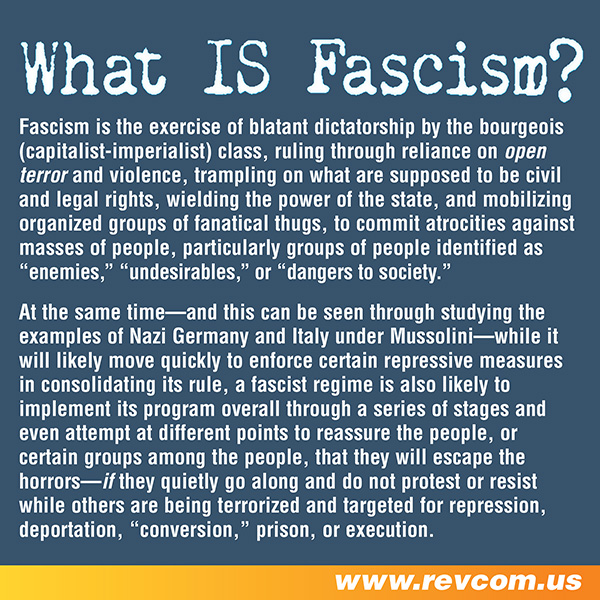
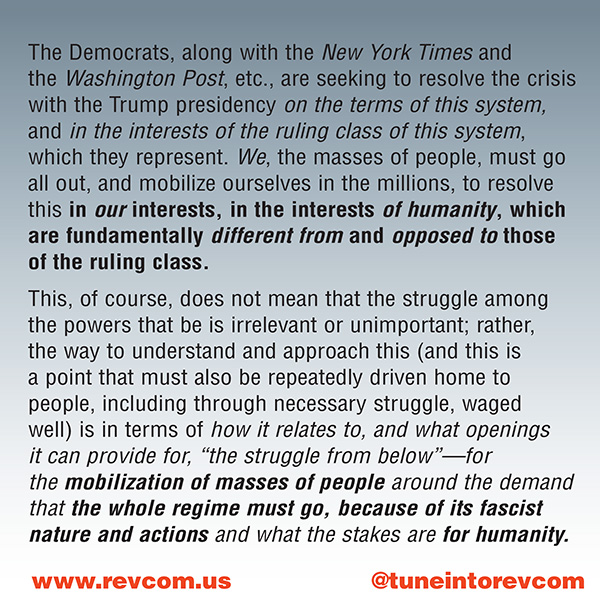
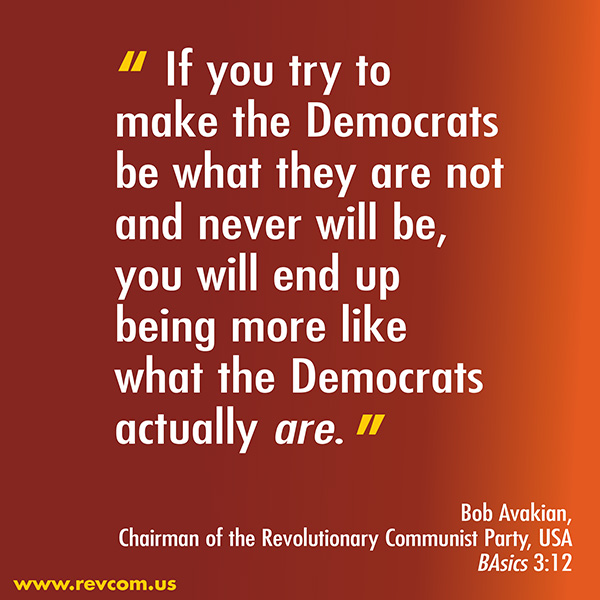
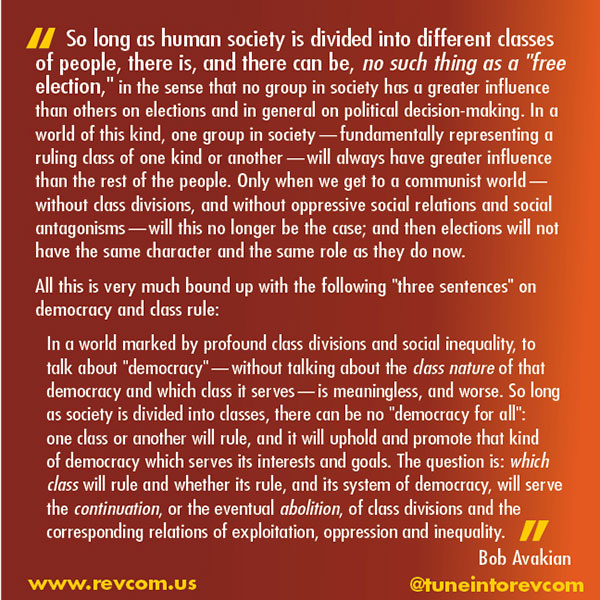

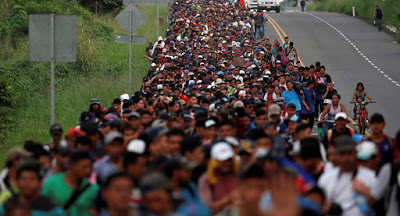

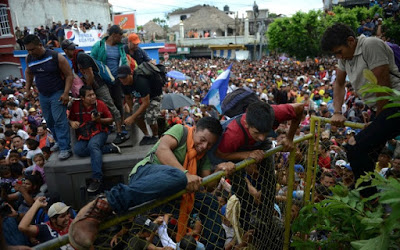
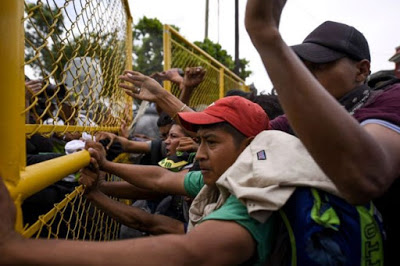

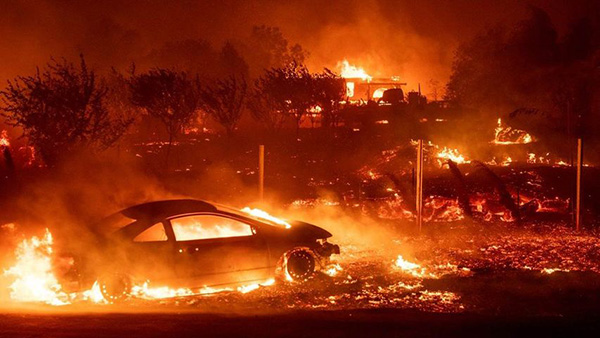
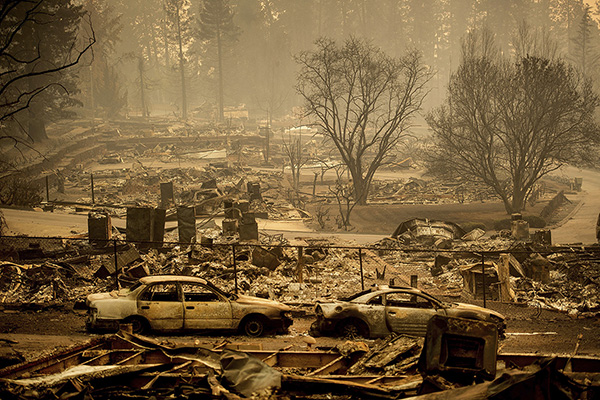
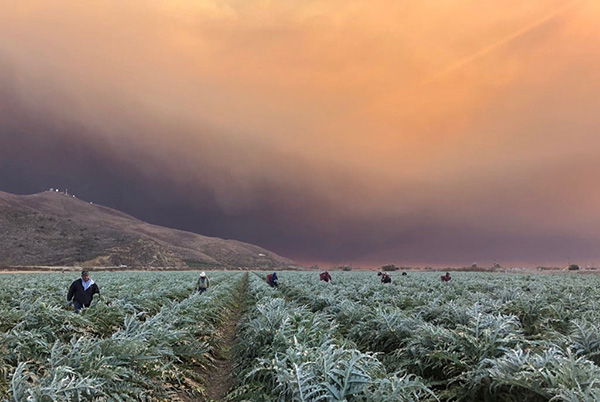
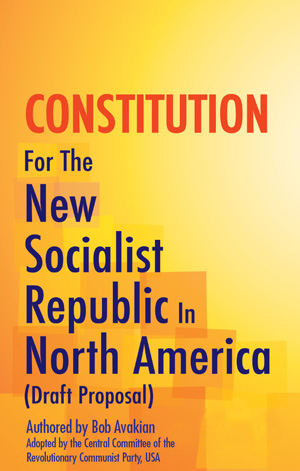

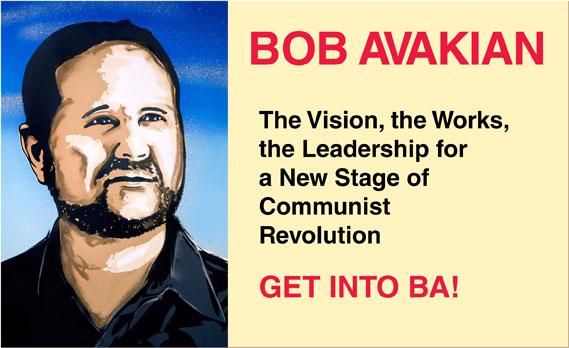
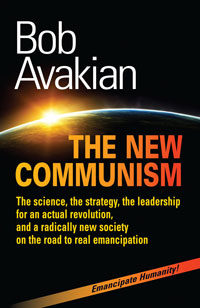




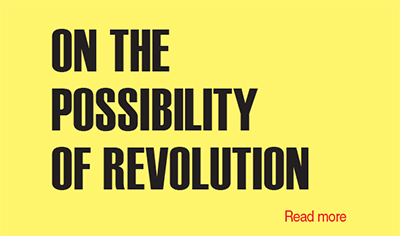
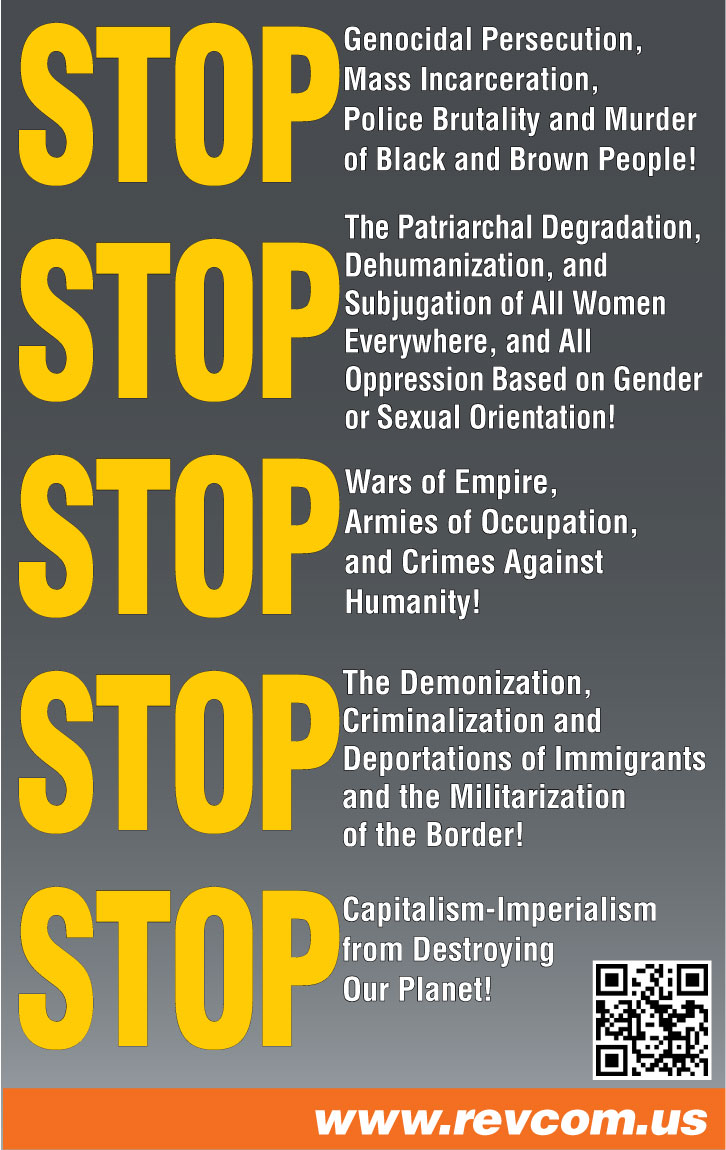
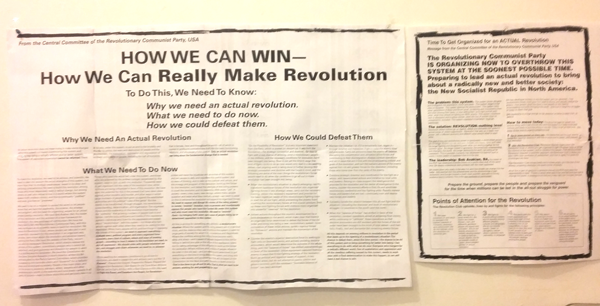
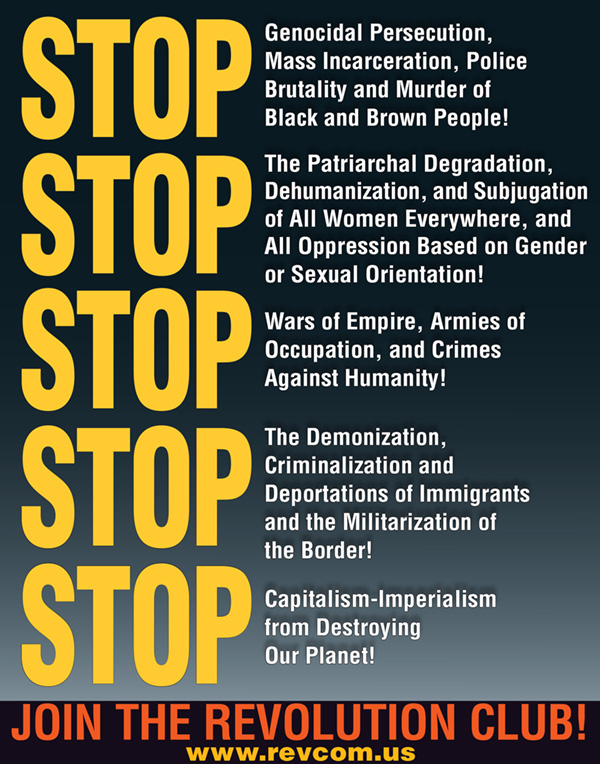
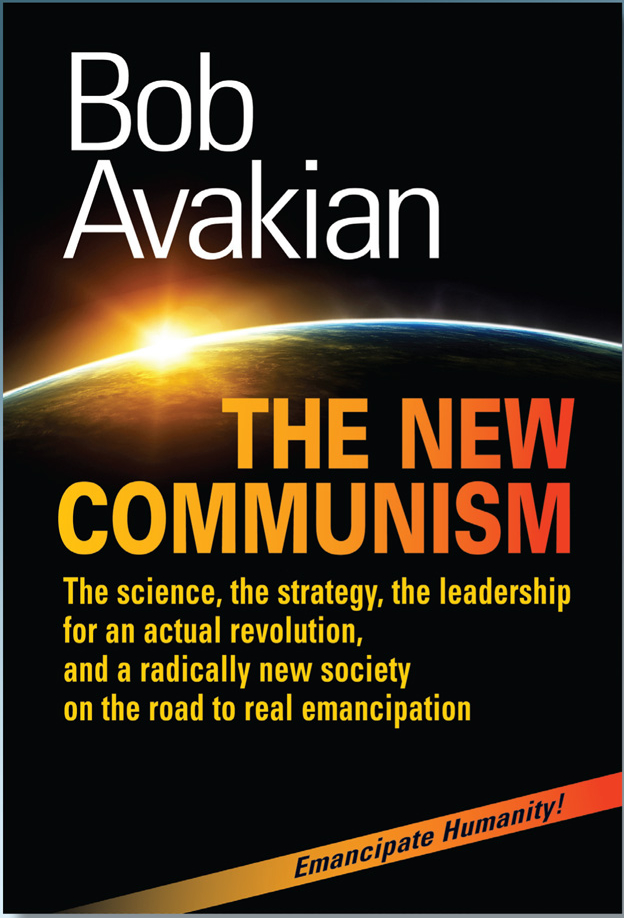
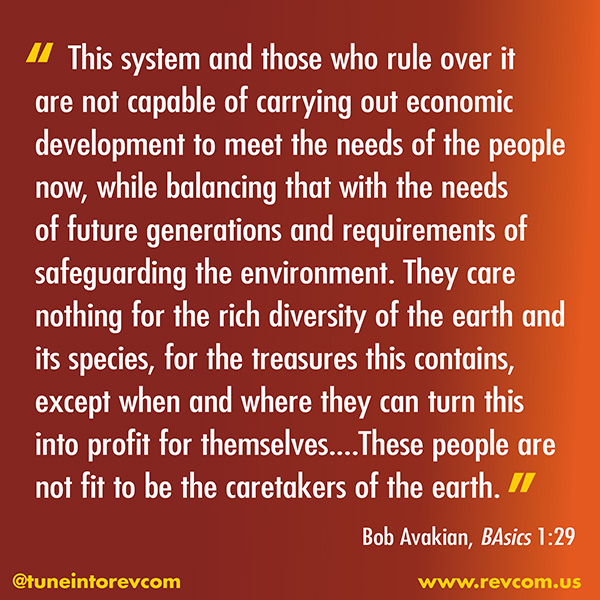
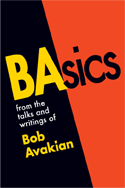
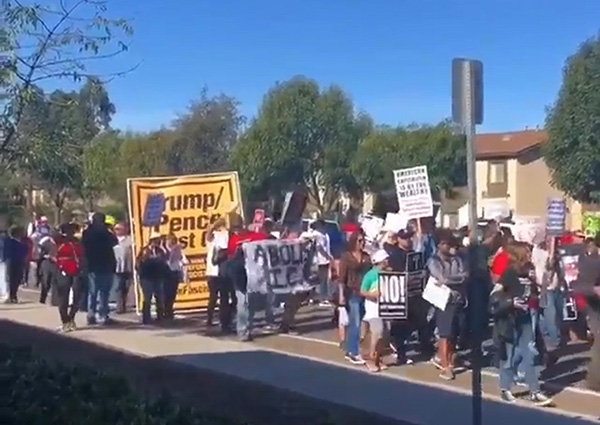
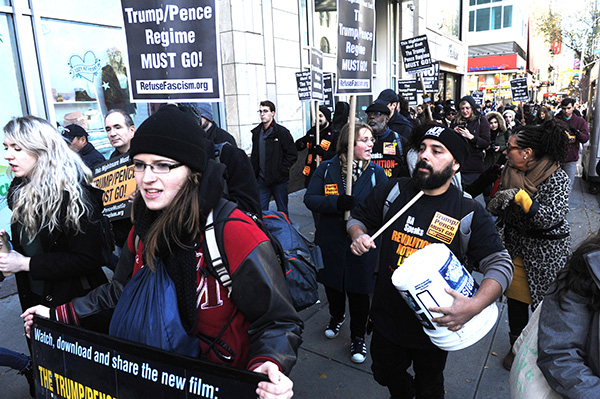
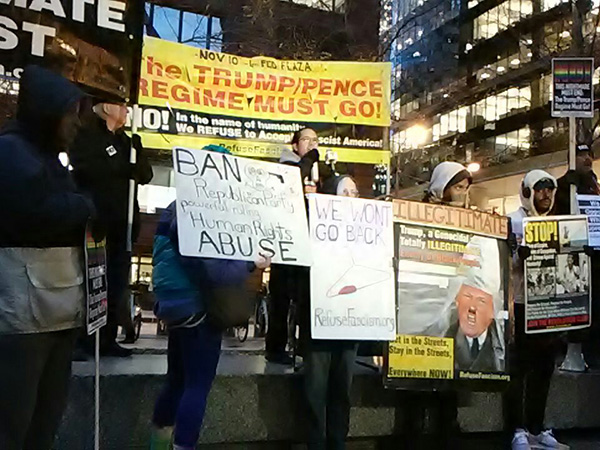
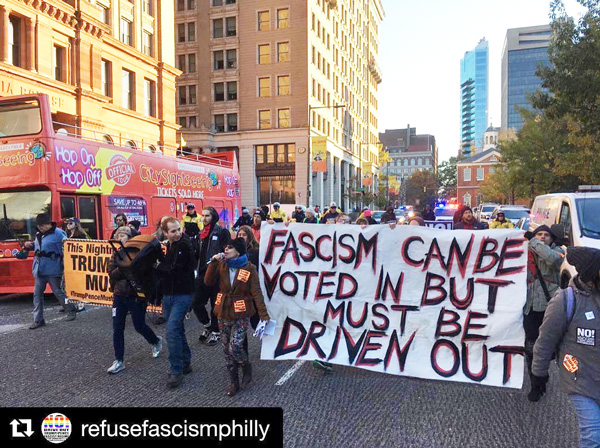
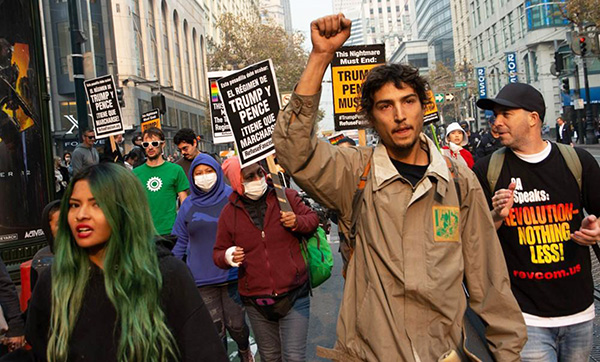
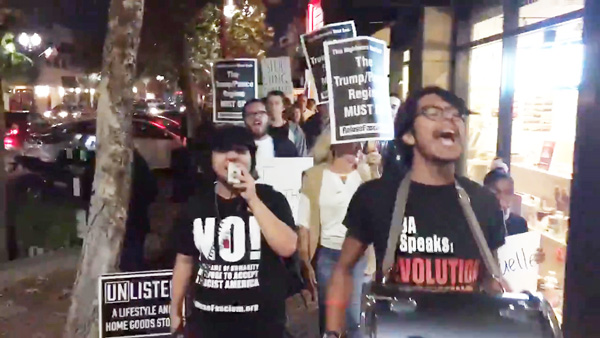
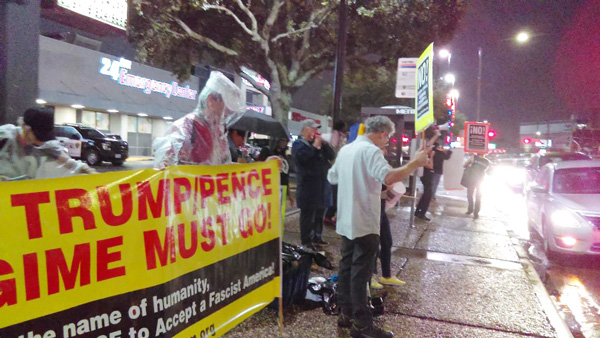
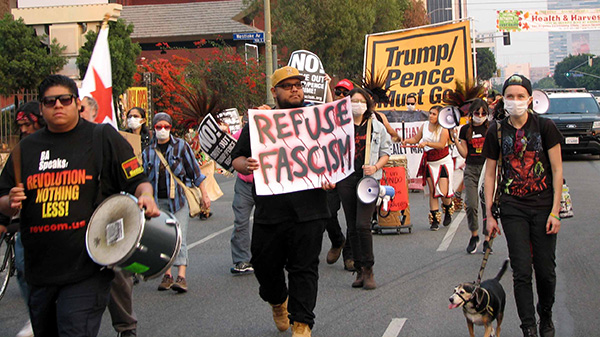
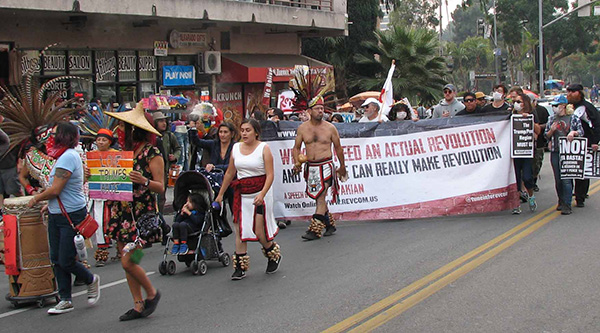
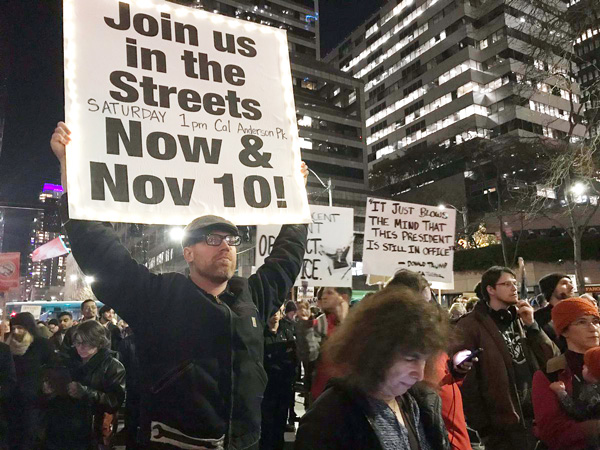


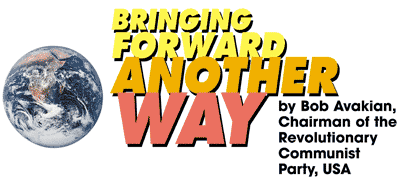

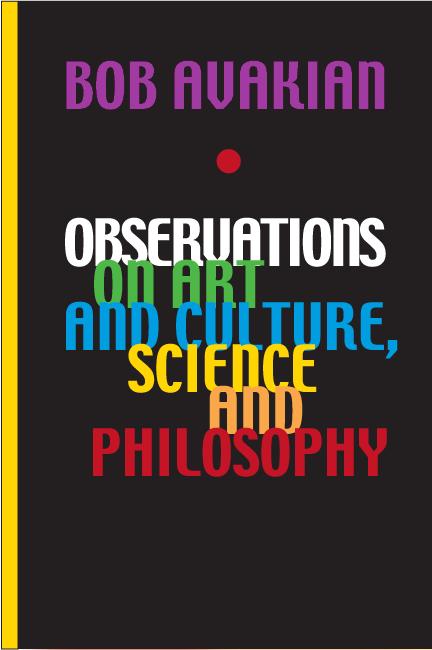
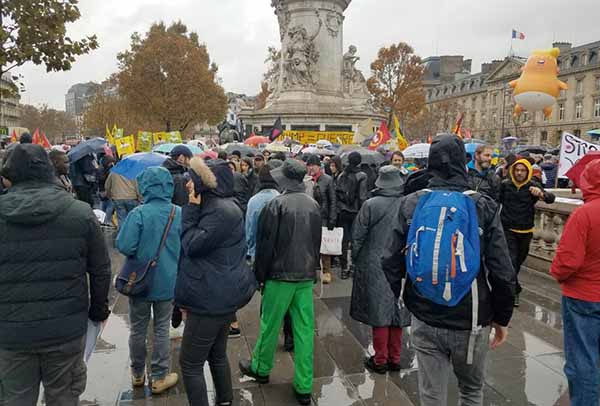 On the 11th, 2,500 people came out in pouring rain to protest not just Trump, but also Macron, Israel’s Netanyahu, Putin, Turkey’s Erdoğan, the Islamic Republic of Iran and others.
On the 11th, 2,500 people came out in pouring rain to protest not just Trump, but also Macron, Israel’s Netanyahu, Putin, Turkey’s Erdoğan, the Islamic Republic of Iran and others. 